THE
BEATITUDES
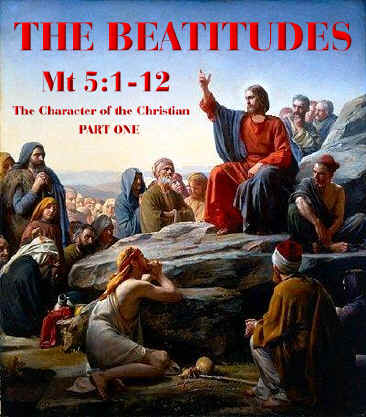
The Character of the Christian
PART ONE
(Mt
5:1-12)
a study by
Dr.
T.E. VanBuskirk
SCRIPTURES
QUOTED IN THIS STUDY: Student must look up EVERY scripture
reference in this
study in their King James Bible. That includes all of those scriptures
that are partially or wholly quoted in the textbook. This
is a requirement for the course.
If you do not look up every scripture referenced in the textbook then you will
fail the course.
Blanks in the
workbook: - There
are various blanks throughout this study. There is no provision for
you to fill in those blanks. They are there only to make sure that you look up
the references in your KJV. You must look up every scripture referenced whether
there are blanks or not.
ATTENDANCE/STUDY/TESTING
REQUIREMENTS
- STUDY:
Study
only one section of the textbook at a time looking up every
scripture referenced in the text, that includes those
scriptures that are partially or wholly quoted in the text, in
your King James Bible unless you are specifically instructed
otherwise for certain references. Then take the
section test at the end of each section. You may not
proceed to the next section until you pass the test for the
current section and have looked up the correct answers in
your textbook and/or the King James Bible, whichever is
appropriate, for every question answered incorrectly on the
test. Your attendance requirement for the
next section begins the day after you pass the test
for the current section and carried out the correct
answer lookup procedure.
- SIGN
IN:
If you have not already signed in to begin your official attendance for this course, then do
so now and mark the form "Begin."
Click
HERE
to go to the sign in form.
- ATTENDANCE:
Each section requires a minimum of one week attendance.
You may not go
on to study the next section of the text until the day after you have passed
the test for the current section.
Minimum attendance for the
entire course is 9 weeks.
Course is worth 1.5 credits. You will be eligible to take
the Final Test on or after the first day of the 10th week
after your sign in date for the course. Keep a record
of your Sign In to "Begin" this course, including
the date of sign in, because you
will be required to enter that date on your Sign In form
when you "Finish" this course.
This link is to a printable page, the COURSE RECORD FORM, that you
will use to record all
necessary information about this course. You will need
the information later so you must use this form so you will
have it all in one place handy for use.
- SHORT
LESSONS:
I realize these are very short lessons.
However, they are lessons in Christian character and, after
studying them, each one should be meditated upon to help
assimilate them into our lives. After studying each trait we
need to make them a goal to strive toward and then, after
meditation and prayer, make them a part of our character.
The week of required attendance will give you an opportunity
to accomplish this goal.
- TESTING:
ATTENTION
- ALL TESTS IN THIS
COURSE, INCLUDING PRACTICE TESTS, ARE ACTIVE AND ARE
REQUIRED OF ALL STUDENTS.
-
Make sure
you read and submit the Testing
Instructions Agreement if you have not
already done so. The
section tests can be taken on or after the 7th day of the
minimum required week of study per section. If tests are
submitted before that time then they will be disallowed and
the student will have to retake them when the attendance
requirements have been met.
- If you fail
a test, you MAY NOT attempt
that test again on the same day. You must restudy that
section in the textbook and find all of the correct answers to the
questions missed and then retake the test no sooner than the
next day.
TABLE OF CONTENTS
Beatitude One
Beatitude Two
Beatitude Three
Beatitude Four
Beatitude Five
Beatitude Six
Beatitude Seven
Beatitude Eight
Beatitude Nine
NOTE - As a matter
of interest: It has been proposed that
chapter 23
of Matthew gives the negative of the Beatitudes.
Introduction
and
LESSON
ONE
The
poor in spirit.
Matthew 5:3
"Blessed are the poor in spirit: for theirs is the kingdom of heaven."
Memorize Mt 5:3 with proper punctuation.
You will need it for both the section test as well as for the Final Test.
Introduction:
The first step
in developing true Christian character is to realize our destitute condition.
In our country today, the USA, it is the mantra of Secular
Humanism that everyone needs high "self-esteem." If you run a
Google search on the internet you will come up with 3,400,000
pages having to do with that subject.
From
the www.womenshealth.gov website which
is "The Federal Government Source For Women's Health" comes the
following article from November 12, 2008.
U.S. Teens Brimming With Self-Esteem (16)
WEDNESDAY,
Nov. 12 (HealthDay News) -- Today's American high school students are far
likelier than those in the 1970s to believe they'll make outstanding spouses,
parents and workers, new research shows.
They're
also much more likely to claim they are "A" students with high IQs --
even though other research shows that today's students do less homework than
their counterparts did in the 1970s.
The
findings, published in the November issue of Psychological Science,
support the idea that the "self-esteem" movement popular among today's
parents and teachers may have gone too far, the study's co-author said.
"What
this shows is that confidence has crossed over into overconfidence,"
said Jean Twenge, an associate professor of psychology at San Diego State
University.
She believes that decades of relentless, uncritical boosterism by parents and
school systems may be producing a generation of kids with expectations that are
out of sync with the challenges of the real world.
"High
school students' responses have crossed over into a really unrealistic realm,
with three-fourths of them expecting performance that's effectively in the top
20 percent," Twenge said. (Underlines are mine. - Dr.
VBK)
That article shows that the problem caused by the uncritical boosting of children's
egos by both parents and public schools in the secular/physical realm has grown
over the decades. We are not teaching children that they can do anything,
be anything, and attain anything that they want; instead we are teaching
them that they can do everything, be everything, and have everything. And
that is an unhealthy attitude that leads to a totally egocentric worldview as
the children mature into adulthood. The problem has grown in magnitude to
the point that it is troubling even to the totally secular psychiatric community
that was one of the driving forces of the "self-esteem" movement over
those same decades.
The article goes on to say:
Twenge stressed that youthful confidence isn't necessarily bad. "Young
people have always had some degree of starry-eyed optimism, and that's probably
a good thing," she said. "And setting goals for yourself is a good
thing. It's just when those goals are wildly unrealistic, then that can cause
trouble for everyone."
For
example, young people entering the workforce may score well in job interviews if
they exude self-confidence, she said, but that can quickly sour if a new
employer doesn't provide them with the perks or promotions they feel they
deserve. "They don't set the right goals for themselves, because
they are overconfident -- and that's when it blows up in their face,"
Twenge said.
The blame for all this may lie with well-intentioned adults, she
suggested.
"These
kids didn't raise themselves, they got these ideas from somewhere," Twenge
said. With Mom and Dad handing out endless praise, kids today readily believe
they are somehow superior, she said. And teachers aren't blameless,
either: According to Twenge, research shows that high school teachers now
give out an "A" grade more easily than their counterparts did in the
1970s, even though today's high school students report doing less homework than
students from that era. (Underlines are mine. - Dr.
VBK)
It is obvious
that even in the secular realm the boundless and unchecked push for high
self-esteem is problematic in its results, to say the least; and to say the most
it is, without a
doubt, causing widespread societal and personal problems. To raise a
generation of young people with such an unbounded egocentric worldview is to court
disaster on all fronts, personal, familial, societal, and global. It leads
to an uncooperative mob of takers instead of givers, claimers instead of doers,
workers who are not trustworthy nor loyal, and spouses who take instead of give
and have no desire nor ability to make marriage, the very foundation of our
society, work in spite of outside difficulties and obstacles. Nor can they
face and surmount the inside
difficulties of meeting their spouses needs, which are sometimes selfish ones, and the failure of
their spouse to always meet their needs because the spouse has the same
egocentric worldview that they have. And with both of them having an egocentric
worldview and their belief that they are somehow superior and have a right to
whatever they want for themselves, no matter how fanciful or unrealistic those
wants may be, they are unwilling and, psychologically, even unable to work through the
problems and make the marriage work. Every precept of biblical
marriage, starting with the attitude of putting the spouses needs above their
own, is foreign to their very makeup which has been trained to take, expect, and demand,
instead of give, cooperate, and ask. And the compromise that is an
indispensable necessity whenever two people are joined in the partnership of
marriage, is shipwrecked on the unforgiving shoals of "I have a right to
whatever I want and no one has the right to oppose me in my quest."
And that is
just the tiniest tip of the iceberg in the secular realm.
The professionals in the "self-esteem" promoting field
are generally afraid to buck the tide because of personal, and many time
selfish, reasons.
The
New York Times
Magazine
The Trouble With Self-Esteem (26)
By Lauren Slater
Published: Sunday, February 3, 2002
"Perhaps,
as these researchers (discussed in the article from which this quote is
drawn) are saying, pride really is dangerous, and too few of us know
how to be humble. But that is most likely not the entire reason why we
are ignoring flares that say, ''Look, sometimes self-esteem can be bad for
your health.'' There are, as always, market forces, and they are formidable.
The psychotherapy industry, for instance, would take a huge hit were
self-esteem to be re-examined. After all, psychology and psychiatry are
predicated upon the notion of the self, and its enhancement is the primary
purpose of treatment. I am by no means saying mental health professionals
have any conscious desire to perpetuate a perhaps simplistic view of
self-esteem, but they are, we are (for I am one of them, I confess), the
''cultural retailers'' of the self-esteem concept, and were the concept to
falter, so would our pocketbooks."
"Really,
who would come to treatment to be taken down a notch? How would we get our
clients to pay to be, if not insulted, at least uncomfortably challenged?
There is a profound tension here between psychotherapy as a business that
needs to retain its customers and psychotherapy as a practice that has the
health of its patients at heart. Mental health is not necessarily a
comfortable thing. Because we want to protect our patients and our
pocketbooks, we don't always say this. The drug companies that underwrite us
never say this. Pills take you up or level you out, but I have yet to see an
advertisement for a drug of deflation."
From
the same article, quotes from Emler and Baumeister.
''There
is absolutely no evidence that low self-esteem is particularly
harmful,'' Emler says. ''It's not at all a cause of poor academic
performance; people with low self-esteem seem to do just as well in life as
people with high self-esteem. In fact, they may do better, because they
often try harder.'' Baumeister takes Emler's findings a bit further,
claiming not only that low self-esteem is in most cases a socially benign if
not beneficent condition but also that its opposite, high self-regard, can
maim and even kill." (Underlines
are mine- Dr. VBK)
When we examine the evidence presented so far, one can see that just maybe
they are finally coming to understand that God has it right after all!
Although many of them won't admit He even exists, still, the new direction that
is surfacing concerning "self-esteem," according to the new research
from the psychiatrists and researchers themselves, fall right in line with what
God has said in His Word for several millennia:
Psa
10:2 "The wicked in his pride doth persecute the poor: let them be taken in the
devices that they have imagined."
Pro
13:10 "Only by pride cometh contention:"
Pro
16:18 "Pride goeth before destruction, and an haughty spirit before a fall."
Pro
29:23 "A man's pride shall bring him low: but honour shall uphold the humble in
spirit."
Jas
4:6 "But he giveth more grace. Wherefore he saith, God resisteth the proud,
but giveth grace unto the humble."
Now
we will examine the spiritual side of this equation.
We will begin with the now radical acceptance of secular humanism by those
claiming to be "Christian."
The proliferation of the religion of secular humanism has dragged the Biblical
worldview to its lowest level. In the USA, some 78.4% of people claim to be
Christians.(17)
And yet the
number of "Christians" that believe there are other ways to get to
Heaven than through Christ outnumber those who believe in Salvation exclusively
through Christ. In essence they believe that some religion concocted by
man, which is always a religion of man's works, is as effective as the biblical Way of God, Jesus Christ.
Pew Forum, April 4, 2009(17)
A
majority of all American Christians (52%) think that at
least some non-Christian
faiths can lead to eternal life.
And the number of people who believe they can work their way to Heaven
has climbed at an alarming rate in the last half-century.
Pew Forum, April 4, 2009(17)
The
poll also finds that roughly one-third of Americans (30%) believe that whether
one achieves eternal life is determined by what a person believes, with nearly
as many (29%) saying eternal life depends on one’s actions. One-in-ten
Americans say the key to obtaining eternal life lies in a combination of belief
and actions.
If you combine the 29% who believe in
works (actions) with those who believe it is works and belief combined, which
places them in the works category, then the total is 39% who believe it is
possible to work one's way to heaven. We must also add to this number all
of those "Christian" denominations that add works, Baptism, penance,
Lord's Supper, Church membership, etc., to the Salvation process turning them
into a mix of works and belief, which places them in the works category. Then
add those mentioned earlier that believe that man's religion, always of works,
can gain them eternal life without Christ, then
the total reaches an absolute minimum of 75% of so-called Christianity that
believe that works
helps get you to heaven. The essence then, again, is that they
believe man's way is better than God's Way. This is a result of the shift
of Christians away from a biblical worldview.
March
7, 2009
Ed
Stetzer has pointed out some new Barna research on the topic of adults having a
biblical world view. (20)
Barna defines a biblical world view as:
For
the purposes of the survey, a “biblical worldview” was defined as
believing that absolute moral truth exists; the Bible is totally accurate in
all of the principles it teaches; Satan is considered to be a real being or
force, not merely symbolic; a person cannot earn their way into Heaven by
trying to be good or do good works; Jesus Christ lived a sinless life on
earth; and God is the all-knowing, all-powerful creator of the world who still
rules the universe today. In the research, anyone who held all of those
beliefs was said to have a biblical worldview.
Barna
Group:
Overall,
the current research revealed that only 9% of all American adults have a
biblical worldview. Among the sixty subgroups of respondents that the survey
explored was one defined by those who said they have made a personal commitment to Jesus Christ that is important in their life today and that they
are certain that they will go to Heaven after they die only because they confessed their sins and accepted Christ as their savior. Labeled “born
again Christians,” the study discovered that they were twice as likely as
the average adult to possess a biblical worldview. However, that meant that
even among born again Christians, less than one out of every five (19%) had
such an outlook on life.(19)
Summary of the research
definition of a biblical worldview:
Barna defined a biblical worldview as someone who believed
all of the following.
1. Absolute moral truth exists.
2. The Bible is totally accurate in
all of the principles it teaches.
3. Satan is considered to be a real being or force, not merely symbolic.
4. A person cannot earn their way into Heaven by
trying to be good or do good works.
5. Jesus Christ lived a sinless life on earth.
6. God is the all-knowing, all-powerful creator of the world who still
rules the universe today.
The Barna research on worldview going
from 2009 back to 1995 shows that the shift was already at its current point and
has remained constant since 1995. Obviously by 1995 the damage was already
done. Even in the "born-again" group, the statistics show that
those with a biblical worldview were only 18% in 1995, 22% in 2000, 21% in 2005,
and 19% today.
Other
core beliefs denied:
Barna
Group (21)
Views on Spiritual Beings
The
Barna survey asked questions about God, Jesus Christ, the Holy Spirit, Satan,
and demons.
(GOD)
All 1,871 self-described Christians were asked about their perception of God. In
total, three-quarters (78%) said he is the “all-powerful, all-knowing Creator
of the universe who rules the world today.” The remaining one-quarter chose
other descriptions of God – depictions that are not consistent with biblical
teaching (e.g., everyone is god, god refers to the realization of human
potential, etc.).
For the other survey items a four-point opinion scale was used to measure
people’s reactions to statements about each spiritual entity.
(SATAN)
Four out of ten Christians (40%) strongly agreed that Satan “is not a living
being but is a symbol of evil.” An additional two out of ten Christians (19%)
said they “agree somewhat” with that perspective. A minority of Christians
indicated that they believe Satan is real by disagreeing with the statement:
one-quarter (26%) disagreed strongly and about one-tenth (9%) disagreed
somewhat. The remaining 8% were not sure what they believe about the existence
of Satan.
(JESUS
CHRIST) Although a core teaching of the Christian faith is the divinity
and perfection of Jesus Christ, tens of millions of Christians do not accept
that teaching. More than one-fifth (22%) strongly agreed that Jesus Christ
sinned when He lived on earth, with an additional 17% agreeing somewhat. Holding
the opposing view were 9% who disagreed somewhat and 46% who disagreed strongly.
Six percent did not have an opinion on this matter.
(HOLY
SPIRIT) Much like their perceptions of Satan, most Christians do not
believe that the Holy Spirit is a living force, either. Overall, 38% strongly
agreed and 20% agreed somewhat that the Holy Spirit is “a symbol of God’s
power or presence but is not a living entity.” Just one-third of Christians
disagreed that the Holy Spirit is not a living force (9% disagreed somewhat, 25%
disagreed strongly) while 9% were not sure.
A slight majority of Christians (55%) strongly agree that the Bible is accurate
in all of the principles it teaches, with another 18% agreeing somewhat. About
one out of five either disagree strongly (9%) or somewhat (13%) with this
statement, and 5% aren’t sure what to believe.
There is no similar clarity among self-defined Christians regarding how the
Bible compares to other holy books. When faced with the statement that “the
Bible, the Koran and the Book of Mormon are all different expressions of the
same spiritual truths,” the group was evenly split between those who accepted
the idea (19% agreed strongly, 22% agreed somewhat) and those who rejected it
(28% disagreed strongly, 12% disagreed somewhat), while leaving a sizeable
portion (20%) undecided.
From the research it is obvious that the biblical worldview
has become scarce amongst even, so-called, "born-again Christians"
with only 19% of them, less than one out of five, holding a biblical worldview
as compared to 9%, less than one in ten, of Americans at large who do not claim
to be "born-again."
When we examine the Barna research we can see that our
absolute minimum estimate of 75% ties in well with their figures. Their
research shows that even among the narrow group known as "born-again"
Christians, 81% do not hold to a biblical worldview. Given statistical variance
in any research, our estimate of 75% as an absolute minimum can be used as a
very accurate guideline.
SECULAR
HUMANISM
The
teachings of the religion of secular humanism, taught in the public school system as well
as through the prompting of the secular Psychiatric community and their
promoting of "self-esteem" teachings through those schools as well as in the
home, has insidiously infiltrated into the very fabric of our society and
our Christianity. And let us not forget the secular scientific community
and its part in the growth of the problem as they "animalize" our
society with their teachings of evolution. "Man is an animal,"
so they teach, and, therefore, we should expect man to act and react like an
animal. To serve the instincts of self-preservation, self-gratification, and self-propagation,
is expected and only normal of an animal; and, if man is an animal like they say
he is, then animal behavior on a personal and societal level is normal and is
to be expected. Adding to that their teachings concerning the supposedly
inherent ability of the animal to evolve to a higher state leads one to the
inescapable conclusion that man, one day, will reach the heights of perfection
once expected only of divinity. Unbounded knowledge and power over nature and
one's physical self and mind must one day be attained by this animal called man.
And yet, crime is on the rise, animalistic cruelty man to man on a
personal level and nation to nation in wars is on the rise, and even the
genocidal wars and the "inhuman" torture and
slaughter of millions becoming so common in our world today signal the deepening depravity of man, not his
ascendance to greater heights. Even the term "inhuman," as used
in that sense, should be obsolete if one believes the evolutionists view of man.
We are animals doing what animals do when threatened, refused, or deprived, or we perceive
ourselves to be so; we fight back with an animal's fury that knows no
bounds, knows no "human mercy or control." We are a pack of wild
dogs killing and rending to take whatever we want, savagely attacking any enemy that threatens our
animal and instinctive goals of self-preservation, want, and self-propagation.
To reduce man to an evolutionistic animal and then train him
and mentally lift him "up" to a perceived "superiority" over
all other human beings and everything in God's Creation, to give him such a totally unbounded egocentric mindset
is to make man his own final judge. And that judge will, and must, excuse his basest
and most animalistic behaviors and feedings of his fleshly lusts. And
when man becomes his own judge and final authority, then he has become his own "God."
This current egocentric worldview, that is now no longer the mindset
and the domain of only the secularist but is now also the mindset and domain of
at least 75% of the "Christians," is diametrically opposed to the
biblical worldview and God's assessment of man. Only when we develop a
biblical attitude of our worth and position in God's creation, as given in His
perfect Word, will we be able to develop in us the true character of the Christian as
taught and possessed by the divine example of true, godly, character- Jesus
Christ.
In opposition to the secularist, in our studies we will find that it is not
only our physical and mental makeup that is the sum total of what we are and
what we can become. In contrast to that belief, we will find that it is
the combination of the physical, mental, and the spiritual that makes us what we
are and what we can be. In polar opposition from their position, and
even out of their realm of cognition and acceptance, we will see that it is the
spiritual that is transcendent in our development of character and the ultimate
guide for the resultant actions toward, and reactions to, the physical creation
and creatures around us and our mental reactions and adaptations to what may
come in that physical realm. We will see that it is the spiritual side of
man that can balance and control the mental side of man as he copes with life
and his fellow human beings. We will also find that it is only through the
spiritual side of man that we can receive the strength to cope with both the
possible and the impossible and the strength to maintain our sanity in an
increasingly insane world. Finally, we will find that the source of all
strength, ability, stability, in fact the source of all that we need is in the
spiritual, not the physical; and the source of all that we need to
overcome is the source of all things- the Creator, Jehovah God.
Only when
we have access to a biblical worldview through Salvation in Christ, and then
consciously choose to adopt that worldview, will we be able to see that the only way to tap
into that source of power is through our biblical Salvation through belief in Christ
alone,
plus or minus nothing, and the willing acceptance of and use of power and
guidance from and through the Holy Spirit of God.
We will
begin now with the first trait of Christian character as taught by Christ in His
teatise on Christian character known as the Beatitudes.
This first trait of Christian character concerns our
perceptions of ourselves and the true view of us in relation to God.
Read, in your KJV, every
scripture referenced; and then meditate
on the precept(s) taught
in each segment of this study. This
combination of reading and meditating will work together
to begin the transformation within you to bring about
the development of a true Christian character.
Matthew 5:3
"Blessed are the poor in spirit: for theirs is the kingdom of heaven."
Memorize Mt 5:3 with proper punctuation.
You will need it for both the section test as well as for the Final Test.
A. A spirit of destitution.
Having our eyes open to see our condition in relation to God.
Realizing
we are someone who has, is, and can do, nothing. We are spiritually bankrupt!
|
1. This teaches us that God helps those who cannot help themselves.
The
prodigal son. Luke 15:11-32
He could not help himself so he went to his Father.
2. This teaches us that we can have no self-sufficiency, self-reliance,
or
self-confidence. No "self-esteem"
if you will, but rather we
should have
Christ-sufficiency, Christ-reliance,
Christ-confidence, "Christ-esteem."
B. This does not weaken us, as the world thinks, but instead it
strengthens us immeasurably.
As Christians, we can do
anything- through Christ.
1. Never feel weak and helpless as a Christian. Claim
Phil 4:13.
Phil 4:13 "I can do all things through Christ
which
____________ me."
2. In Christ, God has lifted us out of the pig-pen of this earth.
|
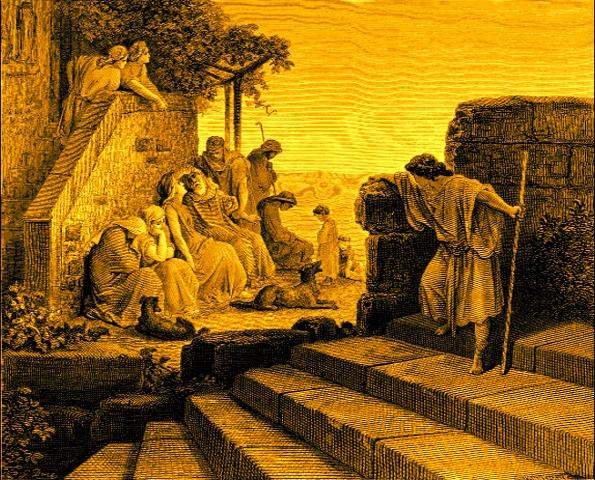 |
Eph 1:3 "Blessed be the God and Father of our Lord Jesus Christ, who hath
blessed us with all spiritual blessings in _________ places in Christ:
Eph 2:6 "And hath raised us up together, and made us sit together in
________
places in Christ Jesus:
C. God sets no limits on our potential; we do!
|
1. Moses.
a. He went from "Who am I to Go..."?
(Ex 3:11)
b. With God's power.
(Ex 3:12)
c. Through the Red
Sea
(Divided by the power of God in
Ex 14:15-31)
d. And was used by God to delivered Israel from bondage.
e. And received God's Law
directly from the hand of God.
|
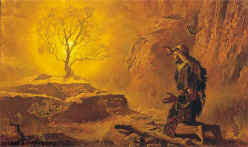
|
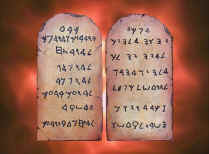 |
|
2. Noah.
a. He went from probably being ridiculed for his seemingly endless labors.
There
is nothing in the Bible that specifically states they laughed at him or
ridiculed
him, but, this
would have been, and is, the normal human reaction of the lost to the
seemingly "unusual" or even seemingly "impractical" or even "ridiculous" actions of
those who live righteous and try
to follow God. Noah would probably top this list of the
"ridiculous" for spending as much as a hundred or more years building a huge and
seemingly useless boat while incessantly preaching righteousness and warning of
eventual judgment to be brought about by water
falling from the sky in enough over-
abundance to flood the
whole
earth. No one had ever seen water fall from the sky
(rain) before this time so this incessant building and preaching of such
wild things must
have seemed
supremely ridiculous to those onlookers and others to whom he preached.
Although it is possible, and maybe even probable, that they did ridicule him,
let us be
careful to not be dogmatic about this when there is no actual biblical proof of
it.
b. To being lifted up above the flood by the power of God. (Gen
6:8-22)
C. Jesus, by His power, can strengthen us to do anything!
1. First, we must realize that we are destitute.
("Blessed are the poor in spirit:...")
2. Then He can save us and strengthen us.
|
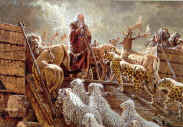
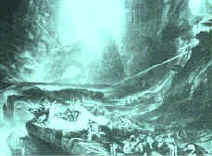
|
|
3. Not to just get by in this life, but He will give us abundant life.
Jn 10:10 "The thief cometh not, but for to steal, and to kill,
and to destroy: I am
come that they might have ____,
and that they might have it more abundantly."
D. Summary.
1. Remember that (if you are saved) you are a child of God!
2. And you can do anything that is according to His will!
3. This is a promise of God that you can claim if you rely on Him
and let Him run your life!
|
 |
E.
Conclusion.
Once we
realize our destitute condition and learn to rely totally on Christ and His
promises of guidance, strength, and power, only then will we be able to fulfill
our supreme potential. And that supreme potential will far transcend anything we
could ever hope to do or be on our own in all three spheres: physically,
mentally, and spiritually. How much "self-esteem" we may have is
totally irrelevant. How much "Christ-esteem" we have means
everything, because His power and ability offered to us is limitless.
The realization of our destitute condition and learning, and
practicing, absolute reliance on Christ as the only way of achieving our
potential will help set the groundwork for developing true Christian Character
in us.
Mt 5:3 "Blessed are the poor in spirit: for theirs is the kingdom of heaven."
Make sure you have memorized Mt 5:3 with proper punctuation.
You will be
required to quote it from memory for the Scripture
Memorization practice Test and for the Lesson One Test. You
will not include the quotation marks nor the scripture
reference, Matthew 5:3, in your answers.
You will also be
asked if you
meditated on the precept taught in this Beatitude.
| 1. You are
required to click HERE
to go to the practice index page to practice your scripture memorization before proceeding to the Lesson test.
On the practice index page, scroll down to the practice test for this Lesson
and click on it. No practice test scores are added to your file. If you do not
pass the practice quiz, then to take it again just close the test and you will return to the practice index
page and you can choose the test to take it again. When you are finished with your practice, close the practice page to return to this page. |
| 2. You can
not proceed to the Lesson Test without first having a 100% score on the
Scripture Memorization test. Take it as many times for practice as is
necessary to achieve the required score of 100%. |
|
3. Did you
meditate on this beatitude as you were instructed to do?
(Click
one answer.)
Yes
No
Was I supposed to
meditate on it? |
When
you click the TEST link it will download
to your computer. When download is completed, click
"Open" or "Open when done". A window may pop
up
stating that "Windows protected your PC". Click
"More info" and then click "Run anyway" in
the white rectangular box at the
bottom of that window.
-
RESULTS PAGE -
Be
sure to submit a copy of the Results page
in order to have your score registered
to your file.
LESSON
ONE TEST
Lesson test is
"open book" except for the verse memorization question
which must be answered from memory alone as a closed book question.
You cannot proceed to the next Lesson until the day after you have
passed this Lesson Test and found all of the correct answers
in the textbook to all questions missed on this test
even though you received a passing score.
LESSON
TWO
They that mourn.
Matthew
5:4
"Blessed are they that mourn: for they shall be comforted."
Memorize Mt 5:4 with proper punctuation.
You will need it for both the section test
as well as for the Final Test.
Introduction:
Now that we have learned just how destitute
we spiritually are in comparison to God, Christ will now teach us the next
character trait of the Christian. This second trait is sorrow over sin which brings about actions
within us to combat it in ourselves and others.
Today
it seems that nothing is considered sin by the average person. Especially
if it is something that they themselves are involved in. Even in our Churches
the things that once were rebuked as sin, rebuked not only from the pulpit but
also from the pew, are now becoming widely accepted in "Christianity,"
so-called. It was not too many years ago that almost all Christians looked down
on the sexual sins of adultery and fornication. And the natural result of those
sins, having a
child out of wedlock, was once considered a stigma and a blight. Even the sexual sins of the mind which, most often, were
(and are) committed with the help of pornography, were viewed as something no
"decent" person would be involved with. The tool of this sin,
pornography, was considered something "dirty."
"Dirty" magazines that only "dirty old men" or "dirty
young men" would look at. And most Christians considered them something that would pollute
the minds and souls of those that got involved with them.
Leaving this "casual sex" crowd and moving to what modern
society calls a "committed relationship," there was a time when the idea of unmarried men and women "living
together" in a sexual relationship would have been consigned to the level
of something from the dung-heap of society. Instead of a "committed
relationship," as it is euphemistically called today, it was once known as "shacking up" and would have been cause for
Church discipline and the disfellowshipping of any church members involved in
it. And even those others involved in such immorality, who by and large were not
"Church-goers," would have been looked down upon, even by lost society
at large, as at least being "low class." And most people,
Christian or not, would have considered them to
be part of the low-class "bar crowd" of drunks, whores, and whoremongers.
Those views and reactions against such immorality now seems to have gone by the
wayside. And this is true both in lost society at large and, more
appallingly, in the Churches.
Then turning to the other type of sexual sin. Not too many years ago only a few fringe ultra-liberal
"Christian" churches and a very few individuals in American society in
general would have accepted homosexuality
as normal and acceptable. Most people, both Christian and non-Christian, considered such
sexual behavior a
"perversion" or an "abomination." Even the secular
field of psychiatry considered it, and treated it, as aberrant behavior.
Much of the
material one
comes across when researching psychiatry and its diagnosis of, or lack of
diagnosis of, homosexuality concern the
controversial changes
that were made in DSM-II (Diagnostic
and Statistical Manual of Mental Disorders) which had replaced DSM-I.
This manual is used to properly categorize illnesses, both physical and mental,
for purposes of diagnosis. Most of the material online concerned the pros and cons of the removal of the
classification of homosexuality as aberrant behavior from the manual.
However, on closer examination of the DSM-II and the language before and after
the changes, several more editions have now superceded that one, one will find a bit of ambiguity in the original language in the
manual. That aside, it still was a tremendous break with the traditional
psychiatric evaluation of homosexuality as a disorder. To understand psychiatry's original
and long-standing stance on homosexuality, one needs to go back to DSM-I, first
published in 1952, which was produced to replace the 5 competing classification
systems extant at that time. And those systems ranged in usage and origin from
that time back to, or replaced various classification systems traceable back to, at
least the 1880 census with its 7 varieties of mental disorders. In the DSM-I you
will find the following classification:
OOQ-x63
Sexual deviation
This diagnosis is reserved for deviant sexuality which is not
symptomatic of more
extensive syndromes, such as schizophrenic and obsessional reactions.
The term includes most of the cases formerly classed as
"psychopathic personality
with pathologic sexuality." The diagnosis will specify the type of
the pathologic
behavior, such as homosexuality, transvestism, pedophilia, fetishism and
sexual
sadism (including rape, sexual assault, mutilation).(19)
The DSM-I
clearly showed that up until 1952, even secular psychiatry considered homosexuality to be
aberrant and even "pathological" behavior in the same classification
with "transvestism, pedophilia, fetishism and sexual sadism (including
rape, sexual assault, mutilation)."
Today, secular psychiatry refuses to recognize homosexuality as deviant behavior.
And this has been one of the driving forces behind society's acceptance of this
particular sin as an "acceptable alternate lifestyle." Because so many
Christian children have been trained and molded by the public school system over
the years from the early 1970s to now (2009), including indoctrination into this new psychiatric stance on the issue;
and because of psychiatry's influence
in the public and political arena, with the latter, the political arena, wielding total
control over the public school system, those combining factors have fueled the public school system's accelerating
stance that all children need to be indoctrinated into acceptance of this deviant lifestyle as
normal and acceptable. Those same children, radicalized by the public school
system and now grown to adulthood, have permeated the churches with acceptance of homosexuality as normal behavior.
And many of those radicals are even pastoring in churches. This radical
influence "in" our churches, and now, even "from" our churches, has
even gone so far astray from biblical precepts that now more than half of those who
claim to be "Christians" believe that homosexuality
is an "acceptable alternate lifestyle" (66% - Barna Research). Even
among "born-again" Christians it has now climbed to an unbelievable
34%! And on the issue of perverting marriage to include homosexual
marriages, 66% of mainline white Protestants
believe that gay marriage should be legalized and 30% of "Christians" believe that Church weddings for
homosexuals should be allowed and that the clergy should be performing the ceremonies.
Hot
topics:
I have picked these "hot topics" for a reason. There are many
many more, but these will do. All of the research from all of the various groups
show that moral decay is rampant in America. These "hot topics"
were chosen to show not only how accepting of immorality Americans in general
have become, but to also show the moral decay in Christianity at large and how
it has even filtered down, to a lesser extent, to those who claim to be
"born-again" Christians. And the reason this has happened is
because of the lack of true Christian Character amongst "Christians"
who used to be at least some kind of check and restraint on society at large.
This moral decay in Christianity was prophesied by
God in His Word. He even warned that in the churches where sound doctrine
is preached, many will turn away from the truth and turn to preachers that will
tickle their ears.
II
Tim 4:1-4 I charge thee therefore before God, and the Lord Jesus Christ, who
shall judge the quick and the dead at his appearing and his kingdom
Preach the word; be instant in season, out of season; reprove, rebuke, exhort
with all longsuffering and doctrine.
For the time will come when they will not endure sound doctrine; but after
their own lusts shall they heap to themselves teachers, having itching ears;
And they shall turn away their ears from the truth, and shall be turned unto
fables.
And
the falling away from the truth, not falling away from Salvation since that is
an impossibility but falling away from the truth, will not be just in the pew
but it will be even in the pulpit. This has already become part of the
perceptions of society at large who in large measure now believe that
"Preachers are just a bunch of phonies that are after your
money." Such a misperception has been fueled by such caricatures of
"Christian leadership" as Jimmy Swaggart, Jimmy Baker, and Benny
Hinn, among many others. Also fueling these misperceptions are such things as the denomination-wide
turning of a blind eye to the sexual dalliances of the preachers in the
Pentecostal movement and the phony faith healers of the Assemblies of God.
And, yes, even the acceptance of mean-spirited, dictatorial pastors in some of
the Independent Baptist churches has served the devil's purpose in fostering
these perceptions in society.
Mat
24:24 For there shall arise false Christs, and false prophets, and shall shew
great signs and wonders; insomuch that, if it were possible, they shall deceive
the very elect.
2Co
11:13-15 For such are false apostles, deceitful workers, transforming themselves
into the apostles of Christ. And no marvel; for Satan himself is transformed
into an angel of light. Therefore it is no great thing if his ministers also be
transformed as the ministers of righteousness; whose end shall be according to
their works.
God warned that this would be an accelerating process
right up to the
Rapture and the revealing of anti-Christ, the Wicked one of Satan, and the
loosing of total evil on this world. (II Thess 2:3-10)
II
Thess 2:3 Let no man deceive you by any means: for that day shall not come,
except there come a falling away first, and that man of sin be
revealed, the son of perdition;
"... falling away..." Gk apostasia
, apostasy
From Robertson's Word Pictures:
Except
the falling away come first:
ean mh elqh h apostasia proton.
Negative condition of the third
class, undetermined with prospect of determination and the aorist subjunctive.
Apostasia
is the late form of
apostasiV and
is our word apostasy. Plutarch uses it of political revolt and it occurs in 1
Maccabees 2:15 about Antiochus Epiphanes who was enforcing the apostasy from
Judaism to Hellenism. In Jos 22:22 it
occurs for rebellion against the Lord. It seems clear that the word here
means a religious revolt and the use of the definite article (mh)
seems
to mean that Paul had spoken to the Thessalonians about it.
And at the root of this
accelerating problem in our churches that is helping to fuel the acceleration
of the problem in society at large is (1) the lack of a biblical worldview
in Christians and (2) the concomitant disappearance of true Christian
Character from God's people brought about because of that erroneous and ungodly
worldview.
According to the scriptures we are the
ones that are keeping ultimate evil at bay. The Holy Spirit working through
Christians is the restraining force for good in the world today. And only with
a biblical worldview, and specifically that view as it concerns ourselves and
our view of sin, will Christians be fit for God's use in the matter. The Bible speaks of a
"great falling away" that will happen prior to the rapture and the
revealing of that man of sin. And that is speaking of a widespread apostasy-
which is now upon us. Many who claim to be God's people have strayed so
far from biblical Christianity that one has to wonder if the majority of them
are even saved. (James chapter 2) When they fall away, as so many
of them are now doing, are they falling away from God (which we have seen in the
course on Eternal Security is an impossibility for someone who is truly saved) or are they falling away
from "Religion?" God will not allow His own to fall away even
from biblical "Religion" to the
extent seen in "Christianity" today. He guarantees that for His
own, "Be sure your sin will find you out." And that means
that Christians straying from the plain principles of the Bible will be
found out and exposed as sinners living in an ungodly fashion.
He promises chastisement of His wayward children and gives a warning of the
danger signaled by the lack of such chastening.
Heb
12:5-8 And ye have forgotten the exhortation which speaketh unto you as
unto children, My son, despise not thou the chastening of the Lord, nor
faint when thou art rebuked of him: for whom the Lord loveth he chasteneth,
and scourgeth every son whom he receiveth.
If
ye endure chastening, God dealeth with you as with sons; for what son is
he whom the father chasteneth not? But if ye be without chastisement,
whereof all are partakers, then are ye bastards, and not sons.
Pro
3:11-12 My son, despise not the chastening of the LORD; neither be weary
of his correction: for whom the LORD loveth he correcteth; even as a
father the son in whom he delighteth.
And for the lost and saved together, because II Tim
4:1-4 is not specific to either of the two groups, God says that willful
rebellion will be openly exercised as people in general "heap to
themselves teachers, having itching ears;" and that will lead us to
widespread rebellious apostasy.
A sign of that apostasy that is fast coming upon us to
heights, or depths if you will, heretofore undreamed of, is the loss to
those who claim to be "God's people" of the ability to rightly discern truth from fantasy, godly
living from ungodly living, morality from immorality. And a lack of
Christian Character figures largely in the equation as does the looming
biblical possibility that most of them are not even saved but are simply
"religious" and, thus, do not have the indwelling of the Holy
Spirit to guide their discernment concerning such things.
The world is already at the point of moral destitution
which is spoken of in the book of Romans. Not only do they allow the
evil things
that ought not to be, but they take pleasure in those that do those
things. (Romans 1:21-32)
Rom
1:32 Who knowing the
judgment of God, that they which commit such things are worthy of death, not
only do the same, but have pleasure in them that do them.
This inability to any longer discern between right and wrong, the inability,
or unwillingness, to follow the precepts of God within the bounds of a
biblical worldview rather than a secular worldview, has a direct bearing on
the character of each of those who call themselves a child of God.
The first biblical precept we studied concerned our perception of ourselves
and the reality of our condition before a Holy God. We learned we are
to understand and develop the attitude that we truly are "poor is spirit," i.e., we are to fully understand
and believe our
destitute condition before Him.
We will now study the second character trait of a Christian- our attitude
toward sin. And both of these, the first and the second character
traits, need to be ingrained into the very fabric of our
character to the point where they will prompt actions concerning them. This
second character trait will not only address sin in general but, on a more personal level,
it will address our proper attitude toward
our own sin. Finally, we will see the biblical attitude we should have
concerning the sin of the world. And we will learn, infused in all of these
areas and our attitudes concerning them, that a proper attitude, a biblical
attitude, will always stimulate us to proper action.
As you study this section, meditate on it, assimilate it, make it an integral
part of your personal character as you are required to do with all of the
beatitudes. Without this meditation this whole study will be nothing but an academic
exercise. Contrariwise, study plus meditation, which must include
prayer, will afford you a better
chance of gaining the tools,
and the power of God, to change what is necessary within you to bring about
the further development of true Christian character; i.e., it will change the
essence of who you are, what you think, how you act, and further the
transformation of you into a better tool for the master's use.
A. Sorrow over sin.
|
1. All sin is against God.
Ps 51:4
Against thee, thee only, have I sinned, and done
this evil in thy
sight...
We can commit
sinful acts or allow ourselves to develop sinful attitudes toward
other human beings; but, when it comes
right down to it, commission of "sin" is
ultimately and exclusively against
God. Sin is a violation of God's commands;
and, therefore, all such violation can only
be committed against God alone as the
lawgiver, judge, and enforcer. Oh
yes, other human beings are the recipients of
the consequences of our breaking God's
law: they are the ones we murder, lie
to, steal from, gossip against, etc.
However, they are only the recipients of the
consequences and the actions brought about
by breaking God's law, but still, they
are not the one who's law we are breaking. The Bible mentions instances where one
person says he has
sinned against some other human being; but, upon examination
we see that it is
referring to a sinful act toward that person.
Ultimately, however, we must realize that because we have transgressed
the Law of
the one who made the Law that we broke, and
the maker of that Law was God, then
the one we have actually sinned against is God alone.
2. All have sinned and, therefore, all have sinned against God.
Rom 3:23 "For all have sinned, and come short of the glory of God;"
3. Sorrow over sin.
We must realize its seriousness, its depth, and its
cost.
This is a
Holy God we are sinning against. One who will not tolerate sin of any
kind or amount. He hates
it. In fact He hates sin so much that He sent His only
begotten Son, Jesus Christ, to die as the only
holy, perfect, righteous sacrifice that
alone could satisfy His righteous demand
that this abominable affront to His holy
person, which is known as sin, be paid for.
a. Sorrow over its seriousness. It sets us apart as enemies of God.
Ro 5:8 talks about,
"... while we were yet sinners..."
Ro 5:10 says that at that time,
"... we were enemies..." of God.
(Col 1:20-22; Jas 4:1-4)
b. Sorrow over its depth. It is immeasurable.
In
Jer 17:9 God tells us that our heart is,
"... deceitful above all things, and desperately
wicked: who can know it?"
And
since the sin that we do is first conceived as iniquity (def. perversity)
in our heart,
then
the deceitful and desperate wickedness of our heart shows us the immeasurable
depth
of our sin. Just as the depth of the deceit and wickedness of our heart
is beyond
the
measure of the knowledge and understanding of any man; so too is the depth of
our
sin. It
is beyond the knowledge and understanding of any man. It is immeasurable.
c. Sorrow over its cost.
It cost
the life of God's only begotten Son.
Joh
3:16 For God so loved the world, that he gave his ___ _________ Son,
that
whosoever believeth in him should not perish, but have everlasting life.
Rom
5:8-10 But God commendeth his love toward us, in that, while we were
yet sinners, Christ
____ for us. Much more then, being now
justified by his
blood, we shall be saved from wrath through him. For
if, when we were
enemies, we were reconciled to God by the death of his Son, much more,
being reconciled, we shall be saved by his life.
|

|
|
B. Sorrow over our sin.
1. It dooms us to Hell and an eternity in the lake of fire. (Ro 6:23; Rev
20:12-15)
Rev
20:15 And whosoever was not found written in the book of life was cast
into the lake of fire.
2. Once we mourn (feel sorrow) over our sin then we are led to repentance.
II Cor 7:9
Now I rejoice, not that ye were made sorry, but that ye
sorrowed to
repentance:
3. And salvation.
II Cor 7:10
For godly sorrow worketh repentance to salvation
not to
be repented
of:
but the sorrow of the world worketh death.
4. And then we are blessed.
Ps 32:1
Blessed is he whose transgression is forgiven,
whose sin is covered.
5. And comforted. (Remember the story of Lazarus and the rich man?)
Lk 16:25
But Abraham said, Son, remember that thou in thy lifetime
receivedst
thy
good things, and likewise Lazarus evil things:
but now he is comforted,
and thou art
tormented.
|
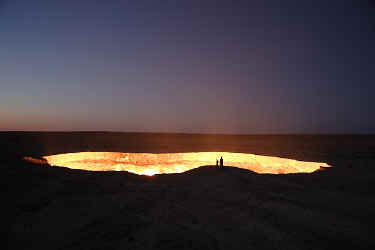
|
6. Summary.
a. We must mourn (realize the depth, and seriousness of our sin),
we must sorrow
over it,
we must feel regret and a desire to be free from it.
b. Then we are led by that sorrow to repentance, salvation, and comfort.
7. But that's not enough- what about the rest of the world?
C. Sorrow over the world's sin.
1. We cannot get caught up in it or we are consorting with the enemy!
Jas 4:4 "... know ye not that the friendship of the world is enmity with God?
whosoever therefore will be a friend of the world is the enemy of God."
a. In the Army, during wartime, you wouldn't be comforted for consorting
with the enemy,
you'd be executed.
b. But God is a little more merciful, He simply chastises us- at first.
c. Then, if we keep it up, He puts us on inactive duty.
d. But if we don't listen, and we force His hand, then He will take us out. (I Cor
5:1-5)
|
2. We must mourn over the world's sin but not get discouraged. (Ezekiel 9:1-11)
a. Those
to be spared. God set a mark on the forehead of those that,
Ezekiel
9:4 "... sigh and that cry for all the abominations that be
done..."
b. Those are to be spared when the
slaughterers come.
Eze 9:1
"He cried also in mine ears with a loud voice, saying, Cause them
that have
charge over the city to draw near, even every man with his
destroying weapon in his hand."
Eze 9:2 "And, behold, six men came from
the way of the higher gate, which
lieth
toward the north, and every man a slaughter weapon in his hand;"
|

|
|
c.
Those that "sigh and that cry" were not to be touched in the slaughter.
d.
Everyone else, man, woman, and child, were to be slaughtered.
c. Mourn over the world's sin, yes, but do not be discouraged.
God is keeping the books. He is keeping track of everyone and everything.
e. The righteous will be comforted and the unrighteous will be punished.
f. All are included: (Refs. are in
Ezekiel and are for reference only, you do not have to
read these whole
chapters unless you want to do so.)
1) Chapters
5-12, the people.
2) Chapter
13, the prophets.
3) Chapter
14, the elders.
4) All who mourn (sigh and cry) will be comforted.
5) Those who do not mourn (sigh and cry) will be slaughtered.
|
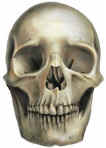
|
g. And those who mourn today are in Christ, (or, OT, looked forward to Messiah)
and when they are
in Christ, who alone is righteous, then they have His
righteousness and will be comforted.
D. Mourning plus action brings many things.
1. When we mourn over our sin then we must do something about it.
a. We repent and believe in Christ. Then God can save us and comfort us.
b. Then after we are saved, mourning plus action brings grace and power.
Jas 4:6 "But he giveth more grace. Wherefore he saith, God resisteth the
proud, but giveth grace unto the humble."
Jas 4:7 "Submit yourselves therefore to God. Resist the devil, and he will
flee from you."
Jas 4:8 " Draw nigh to God, and he will draw nigh to you. Cleanse your
hands, ye sinners; and purify your hearts, ye double minded."
Jas 4:9 "Be afflicted, and mourn, and weep: let your laughter be turned to
mourning, and your joy to heaviness."
Jas 4:10 "Humble yourselves in the sight of the Lord, and he shall lift
you up."
c. Mourning, plus humbling ourselves and drawing nigh to God, brings the grace
and power of God lifting us up in our Christian lives.
2. When we mourn over the world's sin then we must do something about that also.
|
Psalm 126:6 "He that goeth forth and
weepeth, bearing
precious seed, shall doubtless come again with rejoicing,
bringing his sheaves with him.
Mt 28:19 "Go ye therefore, and teach all nations, baptizing
them in the name of the Father, and of the Son, and of
the Holy Ghost:"
Mt 28:20 "Teaching them to observe all things whatsoever
I have commanded
you: and, lo, I am with you alway,
even unto the end of the world. Amen."
|
 |
Mourning plus action ("Go ye...") is obedience to God and
brings assurance
of His
presence in our lives. ("... I am with you alway...")
E. How to be comforted.
1. Do we want comfort in our trials and suffering, in our sorrow over our own sin and
the sin of this world and what that sin is doing to this world?
2. Then we must turn to God, and Him only, for that comfort!
Jn 14:16 "And I will pray the Father, and he shall give you another
Comforter, that he may abide with you for ever;"
|
Jn 14:18 "I will not leave you comfortless: I will come to you."
Jn 14:26 "But the Comforter, which is the Holy Ghost, whom the
Father will send in my name, he shall teach you all things, and
bring all things to your remembrance, whatsoever I have said
unto you."
Jn 15:26 "But when the Comforter is come, whom I will send
unto you from the Father, even the Spirit of truth, which
proceedeth from the Father, he shall testify of me:"
Jn 16:7 "Nevertheless I tell you the truth; It is expedient for you
that I go away: for if I go not away, the Comforter will not
come unto you; but if I depart, I will send him unto you."
3. Christ did depart, (Acts 1:9) and the Comforter, the Holy Ghost, is
with us to comfort
us- if we will let Him!
|
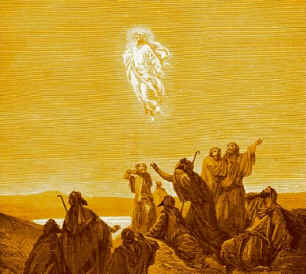
|
Mt
5:4:
"Blessed are they that mourn: for they shall be comforted."
Make sure you have memorized Mt 5:4 with proper punctuation.
You will be
required to quote it from memory for the Scripture
Memorization practice Test and for the Lesson One Test.
You will not include the quotation marks nor the scripture
reference, Matthew 5:4, in your answer.
You will also be
asked if you
meditated on the precept taught in this Beatitude.
| 1. You are
required to click HERE
to go to the practice index page to practice your scripture memorization before proceeding to the Lesson test.
On the practice index page, scroll down to the practice test for this Lesson
and click on it. No practice test scores are added to your file. If you do not
pass the practice quiz, then to take it again just close the test and you will return to the practice index
page and you can choose the test to take it again. When you are finished with your practice, close the practice page to return to this page. |
| 2. You can
not proceed to the Lesson Test without first having a 100% score on the
Scripture Memorization test. Take it as many times for practice as is
necessary to achieve the required score of 100%. |
|
3. Did you
meditate on this beatitude as you were instructed to do?
(Click
one answer.) Yes No Was I supposed to
meditate on it? |
When
you click the TEST link it will download
to your computer. When download is completed, click
"Open" or "Open when done". A window may pop
up
stating that "Windows protected your PC". Click
"More info" and then click "Run anyway" in
the white rectangular box at the
bottom of that window.
-
RESULTS PAGE -
Be
sure to submit a copy of the Results page
in order to have your score registered
to your file.
LESSON TWO TEST
Lesson test is
"open book" except for the verse memorization question
which must be answered from memory alone as a closed book question.
You cannot proceed to the next Lesson until the day after you have
passed this Lesson Test and found all of the correct answers
in the textbook to all questions missed on this test
even though you received a passing score.
LESSON
THREE
The
meek.
Memorize Mt 5:5 with proper punctuation.
You will need it for both the section test as well as for the Final Test.
Matthew
5:5
"Blessed are the meek: for they shall inherit the earth."
|
Introduction:
A. The third Christian Character trait that we will study and
meditate upon is meekness.
B. The world today has a strange idea of what "meek" means. They
always picture Jesus as looking like some long-haired, effeminate,
namby-pamby wimp, with a woman’s eyes and no backbone. The Jesus of
the Bible was exactly the opposite. As a young man He worked with wood
as a carpenter, using only hand tools. That means He was probably quite
strong and agile. Long hair was not the style for the Jews and He was the
epitome of the Jew; and besides, it would have gotten in the way when He
worked. In addition God tells us that even nature teaches that long hair
is a shame to a man. Would Christ do anything that was shameful?
The Father said of Jesus that during His ministry
He single-handedly cleaned out all of the irreverent and thieving
merchants from the Temple, slept on the ground, and walked everywhere He
went which would have tended to keep Him in good physical shape. He
became angry (righteously so) and would not allow the religious crowd to
bully Him into submission. At the end of His life He willingly suffered
the most cruel of deaths, taking the sin of the world upon Himself, and
bore the wrath of God poured out upon Himself so that mankind would have
a way to have peace with God. If that sounds like some kind of
effeminate wimp then I’m the Queen of Sheba!
|
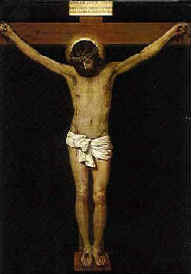
|
Now
that we know how the world perceives
meekness; let’s
find out what it really is.
A. Meek. (F & W)
1. Definitions.
a. Of a gentle and long-suffering disposition.
b. Submissive; compliant; lacking spirit or back-bone.
c. Humble; lowly.
d. Gentle; kind; compassionate; indulgent. (Obsolete as of 1943. F & W)
2. Sorting.
a. The latter part of “b.” (“lacking spirit or back-bone”) can be eliminated as that was
definitely not a characteristic of Christ.
b. That leaves us with, “... gentle and longsuffering disposition; submissive; compliant
(within limits;) humble; lowly; gentle; kind; compassionate; indulgent (again, only
within limits.)
3. Some think that “meekness,” is synonymous with “weakness.”
4. Actually meekness is, “great strength under great control.” And, in the case of Christ,
it was God’s limitless strength under God’s limitless control.
|
B. Christ, our example.
1. He was God in the flesh.
Jn
1:1 "... and the Word was God."
Jn 1:14 “And the Word was made flesh, and dwelt
among us...”
2. He was the omnipotent creator of the universe.
Jn 1:3
“All things were made by him; and without him was not
any thing made that was made.”
3. He was a King, and yet, meek and lowly.
I Tim 6:15 "... the blessed and only Potentate, the
King of kings,
and Lord of lords;" (Also Rev 17:14; 19:16)
Mt 11:29 “Take my yoke upon you, and learn of me; for I
am meek
and lowly in heart: and ye shall find rest unto your souls.”
Mt 21:5 “Tell ye the daughter of
Sion, Behold, thy King cometh
unto thee, meek, and sitting upon an ass, and
a colt the foal
of an ass.”
Not in a plush coach as any other king would but on an ass, a lowly beast
of burden.
|

|
 |
|
4. He single-handedly cleaned out the temple, probably twice.
Mk 11:15 “And they come to Jerusalem: and Jesus went into
the temple, and began to cast out them that sold and
bought in the temple, and overthrew
the tables of the
moneychangers, and the seats of them that sold doves;”
(Also
read: Mk 11:15; Lk 19:45)
5. And yet He
was gentle and held tender little children on His lap.
|
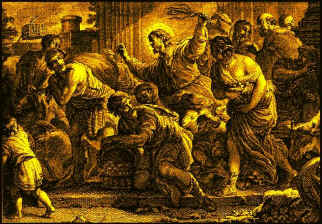 |
|
Mk 9:36 “And he took a child, and set him in the midst of them:
and when he had taken him in his arms, he said unto them...”
6. That doesn’t sound like weakness to me.
a. That sounds like omnipotent strength controlled enough to create all
physical reality, the universe we see and feel around us, and to set
whole worlds in exactly the right place to allow us to live on one of
them. (+ or - 5% in the earth’s orbit and we’d all be dead).
b. And
also controlled enough to be devastatingly wielded against evil;
and yet gentle enough to hold a tender little child.
7. I think we can safely settle on the definition of “meekness” as “great
strength under great control.”
C.
The world thinks that might
makes right.
1.
Jas 4:1 "From whence come wars and fightings among you? come
they not hence, even of your lusts that war in your members?"
2.
Conquerors have always won and ruled by the strength of their arms and
armies. Caesars
and Kaisers, (the German appropriation of
the term,) Khans
and Kings,
have always ruled because of their power; and, from Hitler to
Hussein, if
you stand against them- you die.
3. The world thinks that might (wielded power) makes right.
But
that just is not true.
D.
The world thinks might makes right but God thinks exactly the opposite.
1.
Right makes right and might means nothing!
a. There is no army that can force God because He wields the “dunamiV,”
(dunamis,) the power that created the universe as well as those
armies that exist within it!
b. He even created the nuclear forces that power their mightiest weapons.
c. And on the other end of the scale, organic rather than nuclear, He
created the very hearts that pump the blood that is their very life. And
if it were not for His sustaining hand, those hearts would cease beating
and they would
die. Where would be their mighty power be then!
d. According to the book of the Revelation, one day He will smite entire
nations with just a word. That sure doesn’t sound like weakness to me.
|

|

|

|

|
|
Rev 19:15 "And out of his mouth goeth a sharp sword, that with
it he should smite the nations: and he shall rule them with a
rod of iron: and he treadeth the winepress of the fierceness
and wrath of Almighty God."
Rev 19:21 "And the remnant were slain with the sword of him
that
sat upon the horse, which sword proceeded out of his
mouth: and all the fowls were
filled with their flesh."
|
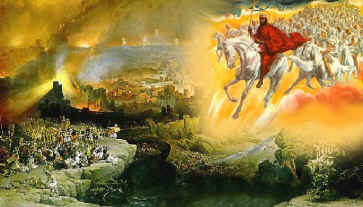
|
2. According to God, the mighty shall not inherit the earth; but, the meek shall!
a. Christ was meek and lowly,
Mt 11:29 "Take my yoke upon you, and learn of me; for I am meek
and
lowly in heart: and ye shall find rest unto your souls."
b. He, as the meek and lowly, shall inherit the earth.
Heb 2:10 “For it became him, for whom are all things, and by whom are
all things...”
c. He is a king of meekness whose strength is wielded only against evil.
Rev 19:16 "And he hath on his vesture and on his thigh a name written,
KING OF KINGS, AND LORD OF LORDS."
d. We shall, and have,
inherit(ed) with Him.
Eph 1:11 “In whom also we have obtained an inheritance...”
Rom 8:17 "And if children, then heirs; heirs of God, and joint-heirs with
Christ..."
e. Beginning with salvation.
1. OT. Ps 149:4 “... he will beautify the meek with salvation.”
2. NT. Rom
10:13 "For whosoever shall call upon the name of the Lord shall be saved."
E. We do not fear the world’s might, because we have overcome the world.
I Jn 5:4 "For whatsoever is born of God overcometh the world: and this is the
victory that overcometh the world, even our faith."
I Jn 5:5 "Who is he that overcometh the world, but he that believeth that Jesus
is the Son of God?"
Ps 37:10 “For yet a little while, and the wicked shall not be; yea, thou shalt
diligently consider his place, and it shall not be.”
Ps 37:11 “But the meek shall inherit the earth; and shall delight themselves in the
abundance of peace.”
|

|
F.
Summary.
The meek shall inherit the earth.
The mighty worldly warriors shall
not!
|
 |
We can see how this Christian Character trait rests upon and builds upon the
foundation of the previous two. Once we have developed in us a spirit of
destitution and its result of total dependence on Christ, and learned to mourn
over sin, then this current characteristic of meekness can be allowed to
develop in the fertile ground prepared by those two in us. But without
the first two, then this third one will never come about for it cannot grow
out of the rocky barren ground of pride and arrogant rejoicing in the face of
our sin. No! It can only take root and grow in the fertile ground of a
repentant, dependant and mournful heart and mind.
Mt
5:5 “Blessed are the meek: for they shall inherit the earth.”
Make sure you have memorized Mt 5:5 with proper punctuation.
You will be
required to quote it from memory for the Scripture
Memorization practice Test and for the Lesson One Test.
You will not include the quotation marks nor the scripture
reference, Matthew 5:5, in your answer.
You will also be
asked if you meditated on the precept taught in this Beatitude.
| 1. You are
required to click HERE
to go to the practice index page to practice your scripture memorization before proceeding to the Lesson test.
On the practice index page, scroll down to the practice test for this Lesson
and click on it. No practice test scores are added to your file. If you do not
pass the practice quiz, then to take it again just close the test and you will return to the practice index
page and you can choose the test to take it again. When you are finished with your practice, close the practice page to return to this page. |
| 2. You can
not proceed to the Lesson Test without first having a 100% score on the
Scripture Memorization test. Take it as many times for practice as is
necessary to achieve the required score of 100%. |
|
3. Did you
meditate on this beatitude as you were instructed to do?
(Click
one answer.) Yes No Was I supposed to
meditate on it? |
When
you click the TEST link it will download
to your computer. When download is completed, click
"Open" or "Open when done". A window may pop
up
stating that "Windows protected your PC". Click
"More info" and then click "Run anyway" in
the white rectangular box at the
bottom of that window.
-
RESULTS PAGE -
Be
sure to submit a copy of the Results page
in order to have your score registered
to your file.
LESSON THREE TEST
Lesson test is
"open book" except for the verse memorization question
which must be answered from memory alone as a closed book question.
You cannot proceed to the next Lesson until the day after you have
passed this Lesson Test and found all of the correct answers
in the textbook to all questions missed on this test
even though you received a passing score.
LESSON
FOUR
The
hungry.
Memorize Mt
5:6 with proper punctuation.
You will need it for both the section test as well as for the Final Test.
Matthew 5:6
“Blessed are they which do hunger and thirst after righteousness: for they shall be filled.”
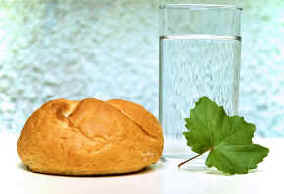
Introduction:
If we are to be in God's will and develop the godly character that He wants to
produce in us, we cannot consider righteousness to be an option.
Instead, we must realize that it is a necessity of life as much as is food and
water.
This necessity of life, righteousness, needs to be treated as the equivalent of
food and water; or even shelter and air, other necessities of life. In other words, all of the things without which we just
simply cannot survive! Human beings will go to any lengths to seek
and obtain these necessities. Nothing will stop us in our quest for food, for
water, for shelter, and our quest for air can best be seen in the thrashings and
contortions of a drowning man trying to climb above the water to fill his lungs
with the air that he desperately needs to live. In this section we will
concentrate mostly on the necessities given by way of example in this
beatitude, food and water.
Families, tribes, and even nations have gone to war to obtain these
and other various necessities of life. The lack of these necessities has caused
unimaginable hardship and suffering.
One example is the great potato famine in Ireland when the staple crop,
potatoes, was devastated for years in a row by a fungus blight that destroyed
this one main food supply. Spreading sometimes as much as 50 miles per day as the
spoors were spread by the wind, the people saw their crop year after year
blacken, shrivel, and begin to stink as it was consumed by the fungi and then
rotted. They had no way at that time to discover what what decimating
their food supply so all they could do was watch, and wail, and die.
| The potato famine in
Ireland
(Picture: London News, Dec. 22,
1849)
Depiction of the Irish
potato famine:
The Sketch of a Woman and Children represents Bridget O'Donnel. Her
story is briefly this:-- '. . .we were put out last November; we owed
some rent. I was at this time lying in fever. . . they commenced
knocking down the house, and had half of it knocked down when two
neighbours, women, Nell Spellesley and Kate How, carried me out. . . I
was carried into a cabin, and lay there for eight days, when I had the
creature (the child) born dead. I lay for three weeks after that. The
whole of my family got the fever, and one boy thirteen years old died
with want and with hunger while we were lying sick. (22)
|
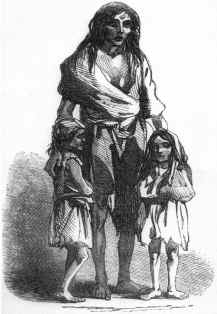 |
By
1847 the lack of food had already caused many thousands to succumb to diseases. Horrific scenes
such as are described below became common.
|
Nicholas
Cummins, the magistrate of Cork, visited the hard-hit coastal district
of Skibbereen. "I entered some of the hovels," he wrote,
"and the scenes which presented themselves were such as no tongue
or pen can convey the slightest idea of. In the first, six famished
and ghastly skeletons, to all appearances dead, were huddled in a
corner on some filthy straw, their sole covering what seemed a ragged
horsecloth, their wretched legs hanging about, naked above the knees.
I approached with horror, and found by a low moaning they were alive
-- they were in fever, four children, a woman and what had once been a
man. It is impossible to go through the detail. Suffice it to say,
that in a few minutes I was surrounded by at least 200 such phantoms,
such frightful spectres as no words can describe, [suffering] either
from famine or from fever. Their demoniac yells are still ringing in
my ears, and their horrible images are fixed upon my brain."
The
dead were buried without coffins just a few inches below the soil, to
be gnawed at by rats and dogs. In some cabins, the dead remained for
days or weeks among the living who were too weak to move the bodies
outside. In other places, unmarked hillside graves came into use as
big trenches were dug and bodies dumped in, then covered with
quicklime.
Most
died not from hunger but from associated diseases such as typhus,
dysentery, relapsing fever, and famine dropsy, in an era when doctors
were unable to provide any cure. Highly contagious 'Black Fever,' as
typhus was nicknamed since it blackened the skin, is spread by body
lice and was carried from town to town by beggars and homeless
paupers. Numerous doctors, priests, nuns, and kind-hearted persons who
attended to the sick in their lice-infested dwellings also succumbed.
Rural Irish, known for their hospitality and kindness to strangers,
never refused to let a beggar or homeless family spend the night and
often unknowingly contracted typhus. At times, entire homeless
families, ravaged by fever, simply laid down along the roadside and
died, succumbing to 'Road Fever.' (23)
|

|
Irish began, by the hundreds of thousands, to seek the necessities of life
elsewhere. Many of them were sent by unscrupulous landlords seeking to rid
themselves of these penniless and starving paupers. As a result, they were shipped off with
(false) promises of land, money, jobs, etc., waiting on the other end. Tens of
thousands of others gaining passage by various other means; but all were seeking
just the bare necessities of life which were no longer to be found in their
homeland.
Heading to North America, or England, or anywhere they could go,
ravaged by typhus and other diseases, tens of thousands died seeking some
place of relief. It is estimated that 1 out of 5 died of disease and
thousands more died from lack of food and potable water while at sea or while
waiting on ships, later called "coffin ships," stretching several
miles down such waterways as the St. Lawrence river in Quebec, Canada.
One of the common North American destinations for the refugees.
By the winter of 1847 the people had begun to fight back out of sheer desperation.
"Six
landlords were shot and killed along with ten others involved in land
management. Among those murdered was Denis Mahon of County Roscommon. He held
the rank of major in a British cavalry regiment and had inherited the property
of Strokestown shortly before the Famine. The property measured 9,000 acres
and contained 28 little villages. After the failure of the potato, he had been
one of the landlords paying to send unwanted tenants to Quebec. Over eight
hundred tenants had thus vacated his estate. But there were still over three
thousand paupers remaining in the villages and he proceeded to evict them all
including 84 widows. For his actions, he was ambushed along the road by two
Irishmen and shot dead. The people celebrated news of his death by lighting
bonfires on the hills around his estate." (23)
By 1849, after a failed insurrection, the Irish were in even worse
straights after British quelling of it. And things were made
absolutely intolerable when that year's crop also succumbed to the fungus.
"By the beginning of 1849, the Irish were suffering on a scale similar to
the worst months of 1846-47. Michael Shaughnessy, a barrister in Ireland,
described children he encountered while traveling on his circuit as
"almost naked, hair standing on end, eyes sunken, lips pallid, protruding
bones of little joints visible." In another district, there was a report
of a woman who had gone insane from hunger and eaten the flesh of her own dead
children. In other places, people killed and ate dogs which themselves had
been feeding off dead bodies.
Men and boys who had never been in trouble in their lives now deliberately
committed crimes in order to be arrested and transported to Australia.
(To the penal colony.)
"Even if I had chains on my legs, I would still have something to
eat," said an Irish teenager after his arrest."
The Irish, for their part, were not about to simply sit still and die. The
whole population of the starving country began to move about. Cities, villages
and entire districts were abandoned. Western Ireland was nearly depleted of
its population. Among country folk, the centuries-old communal way of life
with its traditional emphasis on neighborly sharing, now collapsed. It was
replaced by a survival mentality in which every family, every person fended
for themselves. Family bonds also disintegrated as starving parents deserted
their children and children likewise deserted their parents.
The
potato disaster of 1848 had sparked a new exodus to America. By the tens of
thousands, the Irish boarded ships and departed their beloved homeland,
heading to Boston, New York, Charleston, Savannah, and New Orleans, arriving
there in tattered clothes, sick from the voyage, disoriented, afraid, perhaps
even terrified, but with a glimmer of hope. (23)
By the time the famine subsided several decades later, it was estimated that
2.5 million Irish succumbed to starvation and disease and 1 million more left
Ireland for other lands, desperately seeking for only the bare necessities of
life.
World
hunger today:
"In the 20th Century, conditions existed in many of the world's poorest
countries similar to Ireland during its famine years including: reliance by
the poor on a single staple crop for survival; economic dependence on the
export of cash crops to the world's richest countries to pay off debts;
foreign ownership of the land by rich individuals or corporations; use of the
best farm land for profitable export crops such as cotton and coffee that do
not feed local populations; governmental reluctance to pay for aid to the
poor; widespread incurable disease; and reoccurring natural disasters such as
floods and drought.
In the 150 years since the Great Hunger in Ireland, famines have continued to
wreak havoc in the world. Countries that have suffered man-made or natural
famine disasters since 1850 include: India, China, the former Soviet Union,
Rwanda, Nigeria, Biafra, Ethiopia, Bangladesh, Somalia, Cambodia, North Korea,
and The Sahel (eastern and southern Africa).
Man-made famines resulted from warfare, genocide, and misguided economic
reforms. Natural famine disasters occurred in places such as Bangladesh, where
poor people living on small holdings in the swampy delta islands experienced
floods that ruined their rice crops.
In 1996, a World Food Summit was held in Rome, organized by the Food and
Agriculture Organization (FAO) of the United Nations. Among the findings
discussed -- Throughout the world today one person in five lives in hunger,
totaling some 800 million persons, including 200 million children under five
years of age who suffer from chronic malnutrition and food deficiencies.
Eighty-eight countries, almost half of which are situated in sub-Saharan
Africa, are faced with repeated threats of famine. Half of humanity has a
daily income of under three U.S. dollars. An estimated 10 million persons are
reported to die every year from hunger or hunger-related causes. (23)
I tell you this to give you a slight inkling of what it is to hunger for the
necessity of food. I'll not go into the water wars in the west in the
early 1900's in the United States when whole towns fought for their existence
as their water was siphoned off to fill the taps and water the fields in
and around Los Angeles. But I must make mention of the millions who die from lack of water in many
countries of the world today.
Water
Wars, deprivation, death:
Water has played a central role in several wars in various parts of the world
and will continue to do so with increasing frequency as the world's supply of
fresh water dwindles. One of the best know would be the 6 day war between Egypt and
Israel where attacks on water supplies were used to try to cripple the enemy
and today the control of water supplies and sources has become a political
quagmire as countries insist on their complete control of any water on or
passing through their lands.
A
growing and volatile picture is
developing in the world today as water resources become ever-increasingly
depleted.
Water
and War, by Steve Lonergan
It is now recognized that environmental degradation and both scarcity and
abundance of natural resources are potential sources of conflict – and
cooperation – and need to be more systematically addressed in this context.
Access to fresh water and sanitation services are a precondition to achieving
the other internationally accepted goals in the Millennium Declaration.
Nowhere is this issue more important than in the Middle East, where water is
considered a ‘strategic’ resource and tensions between countries in the
region over it are high. There it has become a major political issue, and the
various peace agreements that have been proposed or signed in recent years all
include water. This has led to claims from various sources – attributed (but
unsubstantiated) to such individuals as Boutros Boutros Ghali and former King
Hussein of Jordan – that ‘the next war in the Middle East will be over
water’. This rhetoric has captured the public imagination and caused much
consternation in the intelligence communities of various countries, who worry
whether water – or other scarce resources – may be a future flashpoint for
international conflict. (24)
Water
for People
Around the world, 884 million people do not have access to safe drinking water
and 2.5 billion are without adequate sanitation facilities. Every day, nearly
6,000 people who share our planet die from water-related illnesses, and the
vast majority are children. (25)
From
the "World Bank Poverty Net Data on Poverty"
1.1.
WATER DEPRIVATION
The
state of water deprivation
POVERTY
MEANS WATER DEPRIVATION
It
is widely recognized that water is vital for multiple and universally
recognized aspects of well-being: health, incomes, safety, and
freedom from drudgery, to mention the four most directly water-related
dimensions. Water deprivation is the other side of precisely
that coin. More than a billion people are deprived of access to water of
sufficient quantity and quality to meet even minimum
levels of health, incomes, safety and freedom from drudgery. Poor women,
moreover, disproportionately bear the burden of
the unpaid chore of fetching water, while they are excluded from many
opportunities to create wealth with water. (10)
|
Jane
Goodall, Project-blue
The
Global Water Crisis
Water
is not an infinite resource. Humans are using the earth’s water
faster than it can replenish itself. Many regions of the world are
literally running out of drinkable water—close to two billion people
now live in water-stressed areas. Maude Barlow, the United Nations’
first Senior Advisor on water issues, considers the global water
crisis to be the greatest threat of all time. It is estimated that by
the year 2025, two thirds of the world’s population will face water
scarcity. This crisis is due to many factors, including pollution,
climate change, and population growth.
(26) |
 |
|
It is obvious from these few
examples that "hunger and thirst" are the realm of need for the absolute necessities
of life. They show us that life with a prolonged shortage of food and water is a struggle against
unimaginable deprivation,
disease, and conflict; and yes, even slow lingering death. For life without
those necessities is impossible.
Hunger
and thirst are two deprivations over which countries, states, families, and
individuals will fight and die. Deprivation of these necessities will bring about
movements of whole populations; and, if they cannot search out those basic necessities of life,
those deprivations inevitably result in the destruction of individuals, families, and
even whole nations.
It is quite obvious then, that if we truly hunger and thirst after something we will
dedicate our lives, our families, and everything we have, to the quest to gain
that thing, for it is in the realm of a matter of life and death necessity!
|


|
Matthew 5:6
“Blessed are they which do hunger and thirst after righteousness: for they shall be filled.”
DEFINITIONS:
A. Def. Of righteousness:
1. (F & W)
a. Conforming in disposition and conduct to the divine standard of right
justice; upright;
virtuous; blameless.
b. Morally right; equitable.
2.
A working Christian definition would be: "Be right and do right to
both God and man."
B. What it is not.
1. Righteousness does not mean simply trying to be good people.
a.
Good, (Gk agaqoV,
agathos) can mean (intrinsically) good in any sense,
often as a noun,
benefit, well. As in, “He is a good man.”
b. Good, (Gk
kaloV, kalos)
prop. beautiful, chiefly used in the fig.,
good (lit. or
mor.) valuable or virtuous. (For appearance or use.)
C. What it is.
The righteousness spoken of in Mt 5:6 is a state of being, given to us by God.
1. Righteousness, (Gk
dikaiosunh, dikaiosunay) equity in character or act, spec.
Christian Justification. (From righteous, Gk
dikaioV, dikaios, meaning equitable in
character or act; by impl., innocent, holy.)
2. The specific word used in Mt 5:6 is “righteousness,” (Gk
dikaiosunh, dikaiosunay)
meaning, Christian justification.
a. The words justified and justification,
(from
dikaiwsiV, dikaiohsis) are from the
same root word as righteousness.
Ro 4:22 “And therefore it was imputed to him for righteousness.”
(Same Gk word as
Mt 5:6)
Ro 4:25 “Who was delivered for our offences, and was raised again for our
justification.” (Same word in
Ro 5:18)
|
b. The reason for the two different words in translation is that the derivative
translated “justification,”
(Ro 4:25) means a making right or just;
a declaration of right or justice; a judicial sentence; acquittal, acceptance,
justification.
c. Thus, “justification,”
is a declaration, by God, of our acquittal, i.e.,
rendering us innocent, but only in Christ.
d. This doctrine of “Justification,” is probably the single most fundamental
doctrine of Christianity.
|
 |
D. Summary:
1. “Righteousness,” does not simply mean “good people,” as that can simply be an
outward thing. You can look righteous outwardly and still not be righteous.
2. Biblically it means those who are, “righteous,” which is an inward possession given
to us by God. (Remember though, inward righteousness always brings forth outward
goodness, holiness, piety, etc. If you look like a duck, act like a duck, and quack like
a
duck, you’re probably a duck. If you look like a Christian, act like a Christian, and talk
like a Christian, then you’re probably a Christian.)
E. “... hunger and thirst after righteousness...” (Mt 5:6)
|
1. Food and water,
"hunger and thirst” concern the very necessities of life.
2. Without them we would die!
3. We must seek God’s righteousness as just as much a necessity of
life as food and water.
4. We must realize that we need God’s righteousness, (justification) and that we can
only receive it through accepting Christ’s sacrifice, (payment) for us, personally.
5. Without Him, and the imputation of His righteousness to us, we would experience
the second death just as surely as we would experience the first if we died of
hunger or thirst. (Refs. Ro 4:25; 5:16 & 18; Rev
ch 20.)
F. “... for they shall be filled.”
1. “Filled,” (Gk
cortazw, chortadzo)
means, to gorge, i.e., to supply with food in
abundance.
2. We will not only be declared righteous by God and filled with His righteousness;
but,
we will be abundantly filled up with
it. We will be gorged with His righteousness!
G. Two steps
farther- action and propagation.
1. When we, “hunger and thirst after righteousness...” we will want to show it.
a. Our faith in Christ as our Justifier, our Saviour, the one who made us righteous,
can only be seen by others through our works and our words.
|


|
b. Therefore, that righteousness (that we hunger and thirst for) can be spread abroad.
(Ro 10:13-17; Jas
2:14-26)
1) Our word:
Ro 10:17 “So then faith cometh by hearing, and hearing by the word of God.”
2)
Our works:
Jas 2:18 “Yea, a man may say, Thou hast faith, and I have works: shew me
thy faith without thy works, and I will shew thee my faith by my works.”
2. When we, “hunger and thirst after righteousness...” we will want to see it everywhere.
| a. We will tell everyone. (Soul-winning.)
To try to increase the righteousness we see around us.
b.
We will show everyone. (Live righteously.)
We do this so that others will want what we have and listen to us
when we tell them how we got the way we are!
(Through Christ; again, soul-winning.)
H. Christ is the only answer for righteousness.
1. For us:
Mt 5:6 “Blessed are they which do hunger and thirst
after righteousness: for they shall be filled.”
Rom 3:21-22
But now the righteousness of God without the
law is manifested, being witnessed by the law and
the
prophets;
Even the righteousness of God which is
by faith
of Jesus Christ unto all
and upon all them that believe:
for there is no difference:
2. For them:
a. God gave righteousness to us.
b. Can we do any less than pass it on to them?
c. Remember, our righteousness has nothing to do with us, it is from
God through Christ.
1) To the Jew first.
Mt 10:7 "And as ye go, preach, saying, The kingdom of heaven
is at hand.
Mt 10:8 “Heal the sick, cleanse the lepers, raise the dead, cast
out devils: freely ye have received, freely give.”
|
 |
2) To the Gentile.
Ro 3:29 “Is he the God of the Jews only? is he not also of the Gentiles?
Yes, of the Gentiles also:”
3) To the World. Mt 28:19 “Go ye therefore, and teach all nations,”
|

|
 |
|
When we hunger and
thirst after righteousness as a very
necessity of life like food and water, then we will be
filled to abundance. And we will want to
see
righteousness in all of those we meet
and
everywhere around us.
|
Mt 5:6
“Blessed are they which do hunger and thirst after righteousness:
for they shall be filled.”
Make sure you have memorized Mt 5:6 with proper punctuation.
You will be
required to quote it from memory for the Scripture
Memorization practice Test and for the Lesson One Test.
You will not include the quotation marks nor the scripture
reference, Matthew 5:6, in your answer.
You will also be
asked if you
meditated on the precept taught in this Beatitude.
| 1. You are
required to click HERE
to go to the practice index page to practice your scripture memorization before proceeding to the Lesson test.
On the practice index page, scroll down to the practice test for this Lesson
and click on it. No practice test scores are added to your file. If you do not
pass the practice quiz, then to take it again just close the test and you will return to the practice index
page and you can choose the test to take it again. When you are finished with your practice, close the practice page to return to this page. |
| 2. You can
not proceed to the Lesson Test without first having a 100% score on the
Scripture Memorization test. Take it as many times for practice as is
necessary to achieve the required score of 100%. |
|
3. Did you
meditate on this beatitude as you were instructed to do?
(Click
one answer.) Yes No Was I supposed to
meditate on it? |
When
you click the TEST link it will download
to your computer. When download is completed, click
"Open" or "Open when done". A window may pop
up
stating that "Windows protected your PC". Click
"More info" and then click "Run anyway" in
the white rectangular box at the
bottom of that window.
-
RESULTS PAGE -
Be
sure to submit a copy of the Results page
in order to have your score registered
to your file.
LESSON FOUR TEST
Lesson test is
"open book" except for the verse memorization question
which must be answered from memory alone as a closed book question.
You cannot proceed to the next Lesson until the day after you have
passed this Lesson Test and found all of the correct answers
in the textbook to all questions missed on this test
even though you received a passing score.
LESSON
FIVE
The
merciful.
Memorize Mt
5:7 with proper punctuation.
You will need it for both the section test as well as for the Final Test.
Matthew 5:7
“Blessed are the merciful: for they shall obtain mercy.”
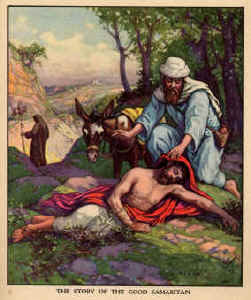
Introduction:
The beatitudes are divided, basically, into 3 sections:
1. The first four beatitudes concerned ourselves.
2. The next three concern our relationships to and with other people.
3. The last one is for all.
Sidenote: A guide to happiness:
1. Remember that happiness is a by-product of righteousness.
2. Aim to be like Christ, with the beatitudes as your guidelines, and happiness will
meet you there.
|
Example: When you shoot at a duck you don’t shoot at the duck; you shoot ahead of it,
aiming at the spot where the duck will be so that the duck and the shot will both get to
the same spot at the same time. If you aim directly at the duck, the duck will no longer
be at that spot by the time the shot gets there and its not possible for you to hit him. If
you want to get the duck, then aim at the spot where the duck will be.
Achieving happiness works the same way. You never aim at happiness, it won’t be
there by the time your shot gets there. Instead, you aim at where happiness will be.
Christ is what you aim at and when you get there happiness will meet you there. Just as
surely as good duck hunting will bag you a duck because you aimed not at where it is but
at where it will be; so happiness can be “bagged” if you aim not at the happiness but at
the spot where happiness will be. Aim to be like Christ.
|
 |
NOTE: There are three things involved in Mt 5:7.
(Read the scripture in your KJV.)
A. Definitions.
1. F&W defines mercy
as:
a. The act of treating an offender with less severity than he deserves; also forbearance
to injure
others when one has the power to do so.
b. The act of relieving suffering, or the disposition to relieve it; compassion.
c. A providential blessing.
2. F&W defines compassion as:
Pity for suffering, with desire to help or to spare;
commiseration;
sympathy with pain or sorrow that prompts one to relieve.
3. In the NT there is one word that is translated “mercy or merciful,” 99% of the time: Gk
eleoV.
That Greek word and its derivatives have only one meaning, compassion or
compassionate.
(Human or divine; espec. active).
4. In the case of the particular derivative used in
Mt 5:7, the meaning carried is specifically
that of
active compassion, i.e., “merciful.”
B.
Involved in Mt 5:7 are the following three things:
1. The first is compassion. (Obviously, from the previous section.)
a. God showed mercy to us (active compassion) when He saved us.
Ti 3:5a “Not by works of righteousness which we have done,
but according to his
mercy he saved us...”
b. We should be the same way with others; both friend and foe alike.
1) Remember that one of the definitions of mercy was,
“forbearance to injure others
when one has power to do so."
2) We have the opportunity to do eternal harm to our enemies by not telling them
about Christ!
3) God had the power to do that to us, but He didn’t.
4) In fact He saved us when we were, “...
at enmity...”
(Ro 8:7; Eph 2:15-16; Jas 4:4)
5)
Also read
Mt 5:43-45.
c. Obviously we are talking about active mercy (compassion).
OK, fine- active mercy. Now, however, the question is, how do we show it?
1) Physically: That’s easy, when we see suffering we do all we can to ease it.
Food, shelter, clothing, visiting the widows, the elderly, those in jail, etc.
(Read Mt 25:35-40)
Mt 25:40 “... as ye have done it unto one of the least of these my brethren,
ye have done it unto me.”
2) Spiritually: That’s also easy.
Two words- compassion and fear.
a) For the lost.
Jude 1:22 “And of some have compassion, making a difference:”
Jude 1:23 “And others save with fear, pulling them out of the fire;
hating even the garment spotted by the flesh.”
b) For the saved.
Gal 6:1 “Brethren, if a man be overtaken in a fault, ye which are
spiritual, restore such an one in the spirit of meekness;
considering thyself, lest thou also be tempted.”
Jas 5:20 “Let him know, that he which converteth the sinner from
the error of his way shall save a soul from death, and shall hide
a multitude of sins.”
d. If you carry this thought through then you will have compassion, active mercy.
1) Treat each person as if it were your own mother, father, or child that was either
going to Hell or was in danger of falling under God’s discipline, maybe even to
the point where they are turned over to the devil for the destruction of the flesh.
I Cor 5:5 “To deliver such an one unto Satan for the destruction of
the
flesh, that the spirit may be saved in the day of the Lord Jesus.”
2) If you carry that thought then you will have the kind of love and sympathy that
compels you to help!
2. The second thing involved in Mt 5:7 is sensitivity. |


|
a. When Jesus saw the grief and destruction that had been brought into the world by
sin as well as the lack of faith of some of the mourners at Lazarus’ death, then the
Bible tells us in Jn 11:35 that, “Jesus wept.” His compassion was quite obvious,
not only here but in other passages as well.
Mt 23:37 “O Jerusalem, Jerusalem, thou that killest the prophets, and stonest
them which are sent unto thee, how often would I have gathered thy
children together, even as a hen gathereth her chickens under her wings,
and ye would not! (Also see
Lk 13:34)
Mt 9:36 “But when he saw the multitudes, he was moved with compassion on
them, because they fainted, and were scattered abroad, as sheep having
no shepherd.”
1) Jesus was sensitive to the needs of humanity.
2) That sensitivity and compassion moved Him to an active mercy.
Rom 5:8 “But God commendeth his love toward us, in that,
while we were
yet sinners, Christ died for us.”
b. Then how do we become sensitive to the needs of
others?
1) “Get inside the other guy’s skin.”
Over
thirty years ago there was a song out that I used to sing. It was called:
“Walk a Mile In My Shoes.” It means the same thing.
a) Jesus did it. (Read
Heb 2:9,10,17-18)
b) When we walk a mile in the other guy’s shoes like Jesus did, then we will
become as sensitive to their needs as He was.
c) That is the best way, but it is not always feasible or possible for us to do so.
2) A good alternative is:
a) Spiritually:
Remember how hopelessly lost we were without God, then we will have active
compassion on the lost. And we’ll go out and do something about it! Also we
will have that same compassion for the saved who have fallen, because they
also are trying to go it on their own, without God’s help. They are as hopeless
and helpless to help themselves out of their backslidden condition as we were to
help ourselves out of our lost one without God. Again, we will do something
about it and help them find their way back to God.
b) Physically:
First: Think how we felt the last time we were hungry or thirsty or behind on
the rent.
Second: Multiply that many-fold and think what it would be like to not have a
place to live at all or not just have a slight hunger but have no food at
all and maybe nothing but the clothes on our back!
c) Warning: I’m not talking about the one who will not work; God says,
“... neither should he eat...”
(II Thess 3:10) I’m talking about the truly
poor or destitute who can not work.
d) “Get inside the other guy’s skin,” i.e., put yourself in the other guy’s place
and you will develop a sensitivity for his needs. Then that new sensitivity
will move you to an active compassion.
3. The third thing involved in
Mt 5:7 is sowing and reaping.
Job 4:8 “Even as I have seen, they that plow iniquity, and sow wickedness,
reap the same.”
Gal 6:7 “Be not deceived; God is not mocked: for whatsoever a man
soweth,
that shall he also reap.”
a. If you want wheat, sow wheat.
b. If you want corn, sow corn.
c. If you want food, sow food.
d. If you want clothes, sow clothes.
e. If you want money, sow money.
f. If you want God to help you, then you help others.
g. If you want mercy, then sow mercy.
h. There have been two preachers that have hurt me immensely in the ministry.
1) One of them so bad that it almost put me out of the ministry. I thought I had lost
my faith in God; but God let me know that I had not lost my faith in Him, I had
simply lost my faith in a man and the devil was just confusing the issue. That
settled the problem with
this second one who hurt me.
2) The first one, however, took much longer. To keep from hating him, I prayed
for him for at least one year and possibly two. I still pray for him when I think
about him. One day not too long ago the subject came up and I couldn’t even think
of his name. I asked my wife what it was and I have prayed for him several times
during the last few days. You just can’t hate someone when you are praying for
God’s will to be done in their lives as you want it done in yours.
3) The point is, I want God’s mercy when I mess up; therefore, I have to show
mercy when others mess up.
4) And you will need His mercy also when you mess up.
5) I take God at His word that I will reap what I sow and so should you!
6) We all mess up from time to time just as sure as mommy and daddy rabbits have
little baby rabbits. Also just as surely, we will receive mercy from God only if
we have shown mercy to those who didn’t deserve it any more than we did.
C. Summary.
1. The three things involved in
Mt 5:7 are compassion, sensitivity, and the law of
reaping and sowing.
2. The way to develop these traits is to strive to be like our example, Christ.
3. To help us develop the habit of showing them actively to our fellow man we should “walk a mile
in his shoes,” or, if that’s not possible, then remember our own down-and-out
times.
4. If
we have allowed the earlier beatitudes to prepare and fertilize our character
through learning, meditation and prayer, then it will be easier for us to let
Christ build this character trait in us also. Which is what He wants to
do in us and for us so that the world can see Him in us by the true Christian
Character that we show to them in our speech and actions. And these
outward manifestations of our character are the only things they can possibly
judge by because it is impossible for them to perceive the true character of
our hearts.
Mt 5:7 “Blessed are the merciful: for they shall obtain mercy.”

Make sure you have memorized Mt 5:7 with proper punctuation.
You will be
required to quote it from memory for the Scripture
Memorization practice Test and for the Lesson One Test.
You will not include the quotation marks nor the scripture
reference, Matthew 5:7, in your answer.
You will also be
asked if you
meditated on the precept taught in this Beatitude.
| 1. You are
required to click HERE
to go to the practice index page to practice your scripture memorization before proceeding to the Lesson test. On the practice index page, scroll down to the practice test for this Lesson
and click on it. No practice test scores are added to your file. If you do not
pass the practice quiz, then to take it again just close the test and you will return to the practice index
page and you can choose the test to take it again. When you are finished with your practice, close the practice page to return to this page. |
| 2. You can
not proceed to the Lesson Test without first having a 100% score on the
Scripture Memorization test. Take it as many times for practice as is
necessary to achieve the required score of 100%. |
|
3. Did you
meditate on this beatitude as you were instructed to do?
(Click
one answer.) Yes No Was I supposed to
meditate on it? |
When
you click the TEST link it will download
to your computer. When download is completed, click
"Open" or "Open when done". A window may pop
up
stating that "Windows protected your PC". Click
"More info" and then click "Run anyway" in
the white rectangular box at the
bottom of that window.
-
RESULTS PAGE -
Be
sure to submit a copy of the Results page
in order to have your score registered
to your file.
LESSON FIVE TEST
Lesson test is
"open book" except for the verse memorization question
which must be answered from memory alone as a closed book question.
You cannot proceed to the next Lesson until the day after you have
passed this Lesson Test and found all of the correct answers
in the textbook to all questions missed on this test
even though you received a passing score.
LESSON
SIX
The
pure in heart.
Memorize Mt
5:8 with proper punctuation.
You will need it for both the section test as well as for the Final Test.
Matthew
5:8
"Blessed are the pure in heart: for they shall see God."
A. Definitions: “pure.”
1. Secular definitions.
a. General:
1) Free from mixture or contact with that which weakens, impairs, or pollutes;
containing no foreign or vitiating (contaminating) material.
2) Free from moral defilement; innocent; chaste; unsullied.
b. Music.
1) Mathematically correct as to intervals.
2) Free from harsh quality in tone.
c. Metaphorically:
(Considered apart from its attributes or from concrete experience, abstract.)
d. “Pure,” derived from < Latin, “purus,” meaning clean.
e. Clean. (F&W)
1) Free from dirt, impurity, or defilement; unblemished; pure.
2) Having no imperfection; complete; perfect; whole.
2. Bible definitions.
a. Gk
kaqaroi
from
kaqaroV(on) (katharos
or katharon), meaning pure, clean, sincere,
unfeigned, upright, virtuous, void of evil.
b.
A thumbnail definition from the Bible would be, “spotlessly clean,”
generally of things and
always of people, and made that way by God and His Word.
Examples:
1)
Acts 20:26 “Wherefore I take you to record this day, that I [am]
pure
(kaqaroV) from the blood of all [men]. “
:27 “For I have not shunned to declare unto you all the counsel
of God.”
They should have been spotlessly clean because Paul had left no spot
uncleaned.
Nevertheless,
Paul himself was “pure,” (spotlessly clean) from their blood because
he had done his part and declared unto them “all the counsel of God.”
2) Ro 14:20 “For meat destroy not the work of God. All things indeed [are]
pure; but [it is] evil for that man who eateth with offence. “
The meat is spotlessly clean. Only certain kinds of use
of it can dirty it.
3) Other uses of the word in scripture:
I Tim 1:5 “... charity out of a pure heart.”
3:9 “... a pure conscience.”
II Tim 1:3 “... pure conscience.”
2:22 “... a pure heart.”
Ti 1:15 “Unto the pure all things [are] pure: but unto them that are defiled
and unbelieving [is] nothing pure; but even their mind and
conscience is defiled.”
Heb 10:22 “... pure water...”
Jas 1:27 “Pure religion and undefiled...”
I Pet 1:22 “... a pure heart...”
Rev 15:6 “... clothed in pure and white linen...”
Rev 21:18 “... the city was pure gold...”
Rev 21:21 “... street of the city was pure gold...”
Rev 22:1 “And he shewed me a pure river of water of life, clear as crystal,
proceeding out of the throne of God and of the Lamb.
“
|
4) Use in Matthew of derivatives of the word.
a) Mt
8:2, 3
In these two verses a derivative of the word is used concerning the
cleansing of a leper by Christ. (Leprosy is also a biblical "type" for sin.)
b) Mt
23:25, 26
In these two verses the same derivative is used by Christ to rebuke
the
Pharisees concerning their lack of internal, (heart, spiritual, etc.) cleanness.
They were all show and no substance.
c)
Mt 27:59
In this verse the derivative word describes the linen cloth that Jesus was
buried in as clean, i.e., unsoiled.
Now compare this with the righteousness of the saints which in
Rev 19:8, 14,
is symbolized by, “clean,” white linen.
|
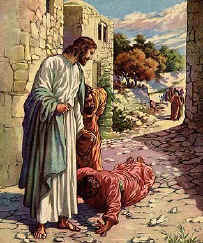
|
c. Now contrast this word
kaqaroV (katharos), and its derivatives, with
agnoV
(hagnos) meaning, innocent, modest, perfect, which is also translated in the
KJV as chaste, clean, or pure.
Phil 4:8 “Finally, brethren, whatsoever things are true, whatsoever things [are]
honest, whatsoever things [are] just, whatsoever things [are] pure ,
whatsoever things [are] lovely, whatsoever things [are] of good report; if
[there be] any virtue, and if [there be] any praise, think on these things.”
I Tim 5:22 “Lay hands suddenly on no man, neither be partaker of other
men's sins: keep thyself pure.”
Jas 1:27 “Pure religion and undefiled before God and the Father is this, To
visit the fatherless and widows in their affliction, [and] to keep himself
unspotted from the world.”
Jas 3:17 “But the wisdom that is from above is first pure , then peaceable,
gentle, [and] easy to be intreated, full of mercy and good fruits, without
partiality, and without hypocrisy.”
I Jn 3:3 “And every man that hath this hope in him purifieth himself, even as
he is pure .”
d. Now contrast
kaqaroV (katharos) and its derivatives with
the word eilikrinh
(aylikrinay) from
eilh (helay) (the Sun’s ray) meaning, judged by sunlight,
i.e., tested as genuine; trans. pure or sincere.
This was the practice of taking pottery, statuary, paintings or other crafted pieces out
into the sunlight in order to see imperfections that otherwise might be hidden to the
eye.
Note the crack across the back end of the bull and extending from
there down toward
the right on the
urn in
the picture to the right.
II Pet 3:1 “This second epistle, beloved, I now write unto you; in [both] which
I stir up your pure minds by way of remembrance:”
3. Comparison. In our text verse,
Mt 5:8, it is now clear, after seeing the other words and
derivatives, that God is not talking about something that is merely clean as in “chaste,
innocent, genuine, or
sincere.”
(Phil; I Tim; Jas; I Jn; and II Pet You have already read
the references.)
Instead, He is talking about a heart that is “spotlessly clean,” which
can only
be brought about by means of God and/or His Word.
|
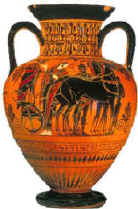
Click picture to see
a larger
image.
|
B. What then does God mean by the phrase, “... pure in heart...?”
1. If we combine the definitions given earlier, we can come up with a usable meaning.
Pure, as in:
a. Free from mixture or contact with that which weakens, impairs, or pollutes;
containing no foreign or vitiating (contaminating) material.
b. Free from moral defilement; innocent; chaste; unsullied.
c. Free from harsh quality.
d. Considered, metaphorically, apart from its attributes or from concrete experience.
(In other words, nothing we can do can bring about this purity.)
e. Free from dirt, impurity, or defilement; unblemished; pure.
f. Having no imperfections; complete; perfect; whole.
2. Summary: A heart that is absolutely and spotlessly clean, whole, perfect, and
undefiled. A pure heart brought about by no action or inherent attribute of our own.
3. I don’t know about you, but not even the slightest part of that definition applies to my
heart in its natural condition!
4. My heart fits right in with the bunch mentioned in God’s statement in Jeremiah.
Jer 17:9 “The heart [is] deceitful above all [things], and desperately wicked: who
can know it?”
C. How do I get this “pure” heart?
1. We have already found that it is not based on what I, or you, can do in this life. Our
wicked hearts make that an impossibility.
2. There is, however, hope in these kinds of impossible situations because our God is a
God that delights in being the God of the impossible.
(Mt
ch. 19; Mk ch. 10; Lk chs. 1 & 18; et al.
These again are just chapters for reference.
You don't have to read them if you don't want to.)
Mk 10:26 "And they were astonished out of measure, saying among themselves,
Who then can be saved?"
Mk 10:27 "And Jesus looking upon them saith, With men [it is] impossible,
but not with God: for with God all things are possible."
Ezek 36:25 “... ye shall be clean: from all your filthiness, and from all your
idols, will I cleanse you.”
Ezek 36:26 “A new heart also will I give you, and a new spirit will I put within
you: and I will take away the stony heart out of your flesh, and I will
give you an heart of flesh.”
Ezek 36:27 "And I will put my spirit within you, and cause you to walk in my
statutes, and ye shall keep my judgments, and do [them]."
Ezek 36:29 "I will also save you from all your
uncleannesses..."
Jas 1:21 "Wherefore lay apart all filthiness and superfluity of naughtiness, and
receive with meekness the engrafted word, which is able to save your souls."
Heb 1:3 Who being the brightness of [ his ] glory, and the express image of his
person, and upholding all things by the word of his power, when he had by
himself purged our sins, sat down on the right hand of the Majesty on high;"
Heb 9:14 “How much more shall the blood of Christ, who through the eternal
Spirit offered himself without spot to God, purge your conscience from
dead works to serve the living God?"
Jas 4:8 "Draw nigh to God, and he will draw nigh to you. Cleanse [your]
hands, [ye] sinners; and purify [your] hearts, [ye] double minded.”
I Jn 1:7 "But if we walk in the light, as he is in the light, we have fellowship one
with another, and the blood of Jesus Christ his Son cleanseth us from all sin.”
C. Purity and righteousness, God’s view and Man’s view.
1. God’s view is in
Romans, I Cor, and I Jn, among many other books and verses.
(You need not read these whole book references because you will read specific verses below)
This is how God sees
us:
a. Ro 6:17 “But God be thanked, that ye were the servants of sin , but ye have
obeyed from the heart that form of doctrine which was delivered you.”
Ro 6:18 “Being then made free from sin, ye became the servants of
righteousness.”
Ro 6:20 “20 For when ye were the servants of sin , ye were free from
righteousness. “
Ro 6:22 “But now being made free from sin, and become servants to God,
ye have your fruit unto holiness, and the end everlasting life.“
Ro 7:17 “Now then it is no more I that do it, but sin that dwelleth in me.”
Ro 7:20 “Now if I do that I would not, it is no more I that do it, but sin
that dwelleth in me.”
I Cor 6:11 “And such were some of you: but ye are washed, but ye are
sanctified, but ye are justified in the name of the Lord Jesus,
and by the Spirit of our God.“
I Jn 3:9 “Whosoever is born of God doth not commit sin; for his seed
remaineth in him: and he cannot sin, because he is born of God.”
b. In God’s eyes we are pure, in Christ, by the Holy Spirit.
2. Man’s view is in James. (This is how other people,
and even we ourselves, see us.)
I call this man’s view, but is it just man’s view? After all God wrote it.
Jas 2:14 “What [doth it] profit, my brethren, though a man say he hath
faith, and have not works? can faith save him?“
Jas 2:17 “Even so faith, if it hath not works, is dead, being alone.”
Jas 2:20 “But wilt thou know, O vain man, that faith without works is dead?”
3.
God and man, a combined view.
a. Jas 2:20 “But wilt thou know, O vain man, that faith without works
is dead?”
b. Mt 7:16 “Ye shall know them by their fruits. Do men gather grapes of
thorns, or figs of thistles?”
Mt 7:17 “Even so every good tree bringeth forth good fruit; but a corrupt
tree bringeth forth evil fruit.”
Mt 7:18 “A good tree cannot bring forth evil fruit, neither [can] a corrupt
tree bring forth good fruit.”
Mt 7:19 “Every tree that bringeth not forth good fruit is hewn down,
and cast into the fire.”
Mt 7:20 “Wherefore by their fruits ye shall know them.”
Gal 6:7 “Be not deceived; God is not mocked: for whatsoever a man
soweth,
that shall he also reap.”
Gal 6:8 “For he that soweth to his flesh shall of the flesh reap corruption;
but he that soweth to the Spirit shall of the Spirit reap life everlasting.“
I Jn 3:7 “Little children, let no man deceive you: he that doeth righteousness
is righteous, even as he is righteous.”
|
4. The trap of “easy believism.”
a.
The Pentacostals, Assemblies of God, Church of Christ, Church of God In Christ,
Catholics,
and
probably 99% of the other churches today, both Christian and non-Christian
accuse
us Baptists of “easy believism."
Westcott
and Hort even called us “perverted.”
b.
Many times, to an outsider, our preaching misleads people into thinking
that’s what we
believe.
c. We spend so much time, and rightfully so, preaching “Grace,” that they fail to
understand
that we place the works part under “Separation,” where it belongs, and not under
“Salvation,”
which is where they place it.
|

|
It is easy to understand why they misunderstand, since most of them have
adopted so many of the world’s traits and habits
that “Separation,” is no longer
a doctrine that holds much sway over them. Therefore, they lump works under
“Salvation,” where it does not
belong, and then accuse us of “easy believism.”
d. Although Salvation and Separation are two different doctrines, God doesn’t
separate them quite so far apart as we Baptists tend to do. He holds them as
two inextricably intertwined and inseparable “Siamese Twins.” Two separate
entities,
yes, but sharing much between themselves.
e. Now stay with me. I’m not teaching Salvation by works; but I am trying to make
a point concerning, “... the pure in heart...” from our text verse,
Mt 5:8.
f. There are two words at
work, ”effectual” and “indicator.”
1) Effectual: definition; (F&W) possessing or exercising adequate power to
produce a designed effect; completely efficient; efficacious.
a) God’s grace through the faith that He gives us, and that we exercise, is all
that is necessary for our Salvation.
b) We will be, “... pure in heart...” and shall, “... see God,” strictly by the
effectual faith, given to us by God’s grace, through the power of the gospel
of Jesus Christ.
(Ro 1:16; Eph 2:8-9)
2) The second word is, “indicator,” defined (F&W) as, that which indicates or
points out.
We will now apply these definitions, especially the second one, indicator, to
our study.
a) You can look at a person’s life,
and I am talking about their life as a whole and
not just small parts, single facets, or, if you will, little snippets of it, and tell if they
are
really saved, i.e., whether they are truly, “... pure in heart...”
II Cor 6:17 “Wherefore come out from among them, and be ye
separate, saith the Lord, and touch not the unclean [thing];
and I will receive you,”
II Cor 6:18 “And will be a Father unto you, and ye shall be my
sons and daughters, saith the Lord Almighty.”
Titus 2:14 “Who gave himself for us, that he might redeem us from
all iniquity, and purify unto himself a peculiar people, zealous
of good works.”
I Jn 1:6 “If we say that we have fellowship with him, and walk in
darkness, we lie, and do not the truth:”
I Jn 1:7 “But if we walk in the light, as he is in the light, we have
fellowship one with another, and the blood of Jesus Christ his
Son cleanseth us from all sin.”
I Cor 6:9 “Know ye not that the unrighteous shall not inherit the
kingdom of God? Be not deceived: neither fornicators, nor
idolaters, nor adulterers, nor effeminate, nor abusers of
themselves with mankind,”
I Cor 6:10 “Nor thieves, nor covetous, nor drunkards, nor revilers,
nor extortioners, shall inherit the kingdom of God.”
I Cor 6:11 “And such were some of you: but ye are washed, but ye
are sanctified, but ye are justified in the name of the Lord Jesus,
and by the Spirit of our God.”
b) You can look at a person’s
persistent and consistent works and tell if they are saved;
i.e., if they are truly, “... pure in heart...”
Mt 7:20 “Wherefore by their fruits ye shall know them.”
Gal 6:7 “Be not deceived; God is not mocked: for whatsoever a man
soweth, that shall he also reap.”
Gal 6:8 “For he that soweth to his flesh shall of the flesh reap
corruption; but he that soweth to the Spirit shall of the Spirit
reap life everlasting.“
I Jn 3:7 “Little children, let no man deceive you: he that doeth
righteousness is righteous, even as he is righteous.”
c) Others, as well as ourselves, can tell if we are truly saved. This is done by
simply examining our life and our works
in it.
D. Both God and Man expect your pure heart to show!
1. Let’s not confuse the “Siamese twin,” doctrines of Salvation and Separation.
They are separate.
2. But let us also not attempt to separate them quite so far apart either.
3. They are inextricably intertwined one with the other.
4. In fact, God says that one without the other is dead.
Jas 2:20 “But wilt thou know, O vain man, that faith without works is dead?”
Meaning that a faith without works is a dead faith; it is not a living faith
capable of being a
channel for
God's grace which bring us Salvation and eternal life. (Eph 2:8-9)
5. Question. Is a supposed accomplishment without an indicator an observable fact?
a. Is someone who says they can fly by flapping their arms stating a true
fact,
especially in the light of our knowledge which has taught us from past
observation that it is impossible for a human being to
fly? Do we believe
them just on their word? No! They have to
prove it is true and the only way
they can do that is to do
it. They will have to fly (observably in the past,
present, or future) by
flapping their arms in order to make us believe that
what they say is truth.
b. Can someone who says they believe in God and are following Him,
as Hitler
stated
he was, be telling the truth? No! By his fruit, the slaughter
of six
million Jews, God’s chosen nation, you can tell
that he was a liar.
Contrary
to what he stated, his actions proved that what he claimed, no
matter how
adamantly he claimed it, was just not the truth.
c. Can someone who claims to be a Christian constantly flaunt the rules set down
in God’s Bible against cursing, lying, cheating, stealing, smoking (killing
them-
|
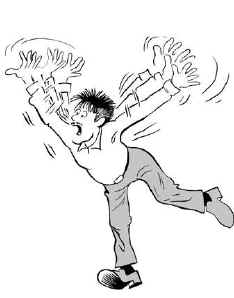
|
 |
selves), dancing (flaunting your body
publicly and enticing members of the opposite sex
who are not your spouse), drinking, not attending church like God commands in Hebrews,
not tithing, not reading their Bible, taking dope, committing adultery and/or
fornication,
etc.; i.e., dressing, talking, walking,
and acting exactly like this world that’s totally given
over to the
Devil? Are they really, “...pure in
heart..?” Do you really believe it,
do they
really believe it, more important does God believe they are pure in heart?
Can they act like
that and truly be saved?
d. Absolutely not!
They will not see God in anything other than judgment and
condemnation?
Gal 6:7 “Be not deceived; God is not mocked: for whatsoever a man
soweth, that shall he also reap.”
6. Summary:
a. Effectual grace, resulting in Salvation, is always observable; i.e., it will have an
indicator,
which is good works.
b. Likewise, effectual purity of heart from God is always observable.
It too will have
the same indicator, good works.
7. What you do in the flesh shows what you are in the spirit.
8. The two, Salvation by Grace and Works in the flesh, are inseparable.
a. The first is the cause of the second.
b. The second is a natural outcome and an indicator of the first.
9. When we have developed the
previous character traits then the outcome will be not just an
outward show
but an inward purity that will show outwardly.
This character trait of purity in heart will develop within us and then manifest
itself to us
and to others
in purity of tongue, purity of thought, and purity of deed.
Job 19:26
“And [though] after my skin [worms] destroy
this [body], yet in my flesh shall I see God.”
Matt 5:8 “Blessed
are the pure in heart: for they shall see God.”
Make sure you have memorized Mt 5:8 with proper punctuation.
You will be
required to quote it from memory for the Scripture
Memorization practice Test and for the Lesson One Test.
You will not include the quotation marks nor the scripture
reference, Matthew 5:8, in your answer.
You will also be
asked if you
meditated on the precept taught in this Beatitude.
| 1. You are
required to click HERE
to go to the practice index page to practice your scripture memorization before proceeding to the Lesson test. On the practice index page, scroll down to the practice test for this Lesson
and click on it. No practice test scores are added to your file. If you do not
pass the practice quiz, then to take it again just close the test and you will return to the practice index
page and you can choose the test to take it again. When you are finished with your practice, close the practice page to return to this page. |
| 2. You can
not proceed to the Lesson Test without first having a 100% score on the
Scripture Memorization test. Take it as many times for practice as is
necessary to achieve the required score of 100%. |
|
3. Did you
meditate on this beatitude as you were instructed to do?
(Click
one answer.)
Yes
No Was I supposed to
meditate on it? |
When
you click the TEST link it will download
to your computer. When download is completed, click
"Open" or "Open when done". A window may pop
up
stating that "Windows protected your PC". Click
"More info" and then click "Run anyway" in
the white rectangular box at the
bottom of that window.
-
RESULTS PAGE -
Be
sure to submit a copy of the Results page
in order to have your score registered
to your file.
LESSON SIX TEST
Lesson test is
"open book" except for the verse memorization question
which must be answered from memory alone as a closed book question.
You cannot proceed to the next Lesson until the day after you have
passed this Lesson Test and found all of the correct answers
in the textbook to all questions missed on this test
even though you received a passing score.
LESSON
SEVEN
The
peacemakers.
Memorize Mt
5:9 with proper punctuation.
You will need it for both the section test as well as for the Final Test.
Mt
5:9
"Blessed are the peacemakers: for they shall be called the children of God."
Introduction: There are three things involved in being a peacemaker:
Mediator, referee, counselor.
A. Definitions: Gk
eirhnopoioi
(ay-ray-naw-poi-oi) plural of
eirhnopoioV
(ay-ray-naw-poi-oss), a peace-maker, one who cultivates peace,
and
concord. In it's plural form in Mt 5:9, peacemakers.
1. Secular: (F&W)
a. peacemaker- One who affects, or seeks to effect, a reconciliation between
unfriendly parties.
b. reconcile- To restore to friendship after estrangement; reunite the alienated
affections of, as of estranged lovers.
c. reconciliation- The act of reconciling, or the state of being reconciled; atonement.
d. atonement
1) Satisfaction, reparation, or expiation made for wrong or injury; something
suffered, done, or given by way of satisfaction.
|
2) Theologically, the sacrificial work of Christ.
2. Bible definitions.
a. Peacemaker- One who seeks to reconcile man and man or God and man; including,
but not restricted to, the Atonement.
b. Atonement - the sacrificial work of Christ.
1) Old Testament- in types of Christ. |
 |
2) New Testament- in fact.
B.
The first thing involved in being a peacemaker is acting as a Mediator.
1. Old saying, “It takes two to tango.”
Which means "it takes two to dance."
However,
when I was a child I thought it said, “It takes two to tangle.”
Which would mean "It takes
two to
fight." My understanding of that old saying would be the one that
best fits our current portion
of this study.
a. Without enmity there is no need of a mediator.
Gal 3:20 “Now a mediator is not a mediator of one...”
1) Man with
man: There we historically see war after war, constant enmity and strife
beginning
with Cain and Able. And that it is accelerating can be seen by the fact
that there have been
more wars fought since
“The War to end all wars,” (as they call the II WW) than
were fought in all of
the history of mankind before that war.
a) Jas 3:16 “For where envying and strife [is], there [is] confusion
and every evil work.”
4:1 “From whence [come] wars and fightings among you? [come
they] not hence, [even] of your lusts that war in your members?”
b)
As long as “lust” is in the world, men will be at enmity with other men.
c) Definition of “lust,” sensual desire. Therefore, not only sexual lust is meant,
but lust in general; i.e., any unchecked desire to only please the senses.
|
d) There are five senses; therefore, there are five kinds of lust.
aa) Sight; lust of the eyes.
bb) Hearing; lust of the ears.
cc) Taste; lust of the mouth or belly.
dd) Touch; lust of the hands or body.
ee) Smell; lust of the nose.
e) As long as people have eyes, ears, noses, tongues, and bodies,
there will be enemies that need reconciliation, man to man, man
to woman, person to person, one to one, and nation to nation.
f) And to the lust of the senses we must add lust of the mind, thought,
the precursor to all strivings and fulfillings of the lusts of the
physical senses.
2) God with man.
Question. Is man naturally the enemy of God?
|
 |
Ro 5:10 “For if, when we were enemies, we were reconciled
to God by the death of his Son, much more, being
reconciled, we shall be saved by his life.”
Col 1:21 “And you, that were sometime alienated and
enemies in [your] mind by wicked works, yet now
hath he reconciled”
Eph 2:15-16 “Having abolished in his flesh the enmity,
[even] the law of commandments [contained] in
ordinances; for to make in himself of twain one
new man, [so] making peace; And that he might
reconcile both unto God in one body by the cross,
having slain the enmity thereby:”
3)
From the previous 2 points it sounds to me like man is enemies with both God and man and
is desperately in need of a mediator.
b. What, or rather who, is the answer, the
ultimate mediator?
|
1) The law is not a mediator.
Gal 3:19 “Wherefore then [serveth] the law? It was added
because of transgressions, till the seed should come to
whom the promise was made; [and it was] ordained
by angels in the hand of a mediator.”
Gal
3:23-24 “But before faith came, we were kept under the law,
shut up unto the faith which should afterwards be
revealed.
Wherefore the law was our schoolmaster [to bring us] unto
Christ, that we might be justified by faith.”
The law was
meant to force the Jew to stay in line with God's ways and
precepts. |
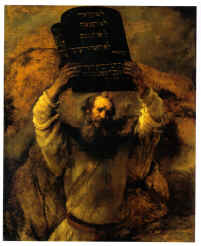 |
Schoolmaster in Greek is paidagogoV,
pa-hee-da-gaw-gos. From this Greek word we get the English word
"pedagogue" which has a slightly different meaning than the Greek
word. In English it is used of, "1. a schoolteacher, an
educator, 2. One who instructs in a pedantic or dogmatic manner."
This is different than the Greek meaning of the word which carries the idea of
force.
Matthew
Henry's Commentary on the Whole Bible (9)
The
law was designed for a schoolmaster, to bring men to Christ, Gal 3:24.
In the foregoing verse, the apostle acquaints us with the state of the Jews
under the Mosaic economy, that before faith came, or before Christ
appeared and the doctrine of justification by faith in him was more fully
discovered, they were kept under the law, obliged, under severe
penalties, to a strict observance of the various precepts of it; and at that
time they were shut up, held under the terror and discipline of it, as
prisoners in a state of confinement: the design of this was that hereby they
might be disposed more readily to embrace the faith which should afterwards
be revealed, or be persuaded to accept Christ when he came into the world,
and to fall in with that better dispensation he was to introduce, whereby they
were to be freed from bondage and servitude, and brought into a state of
greater light and liberty. Now, in that state, he tells them, the law was
their schoolmaster, to bring them to Christ, that they might be justified by
faith.
Robertson's
Word Pictures (9)
(The Greek spelling has
been changed to match the Received Text. Dr. VBK)
Our
tutor unto Christ (paidagogoV
hmwn ... eiV kriston).
See note on I Cor 4:15 for the only other N.T. example of this old and common
word for the slave employed in Greek and Roman families of the better class in
charge of the boy from about six to sixteen. The paedagogue watched his
behaviour at home and attended him when he went away from home as to school.
Christ is our Schoolmaster and the law as paedagogue kept watch over us till
we came to Christ.
That we might be justified by faith (ina
ek pistewV dikaiwqwmen). This is the
ultimate purpose of the law as paedagogue.
Now that faith is come (elqoushV
de thV pistewV). Genitive
absolute, “the faith (the time of the faith spoken of in Gal 3:23) having
come.”
Under a tutor (upo paidagwgon).
The pedagogue is dismissed. We are in the school of the Master.
| 2)
The mediator is Christ.
Man to man, person to person, and, since nations are made up of
people, nation to nation- Christ is the answer.
II Cor 5:17 “Therefore if any man [be] in Christ, [he is] a new
creature: old things are passed away; behold, all things
are become new.”
|
 |
a) The old man cannot rid himself of lust. He must become a, “new creature.”
(Read Ro 8:7-16)
b) If you want to act as a mediator between enemies; then use Christ.
3) God to man- Christ is the answer.
I Tim 2:5 “For [there is] one God, and one mediator between
God and men, the man Christ Jesus;”
Eph 2:15-16 “Having abolished in his flesh the enmity, [even] the
law of commandments [contained] in ordinances; for to
make in himself of twain one new man, [so] making peace;
And that he might reconcile both unto God in one body by
the cross, having slain the enmity thereby:”
2. Summary.
a. Man is at enmity with
both God and other men.
b. For mediation in both these situations, God with man, and man with man,
Christ is the answer.
| C.
The second thing involved in being a peacemaker is acting as a
Referee.
1. Definition:
Someone who is in general control of a game.
a. He judges that the rules are being followed and calls any infractions.
b. He separates antagonists in case of infractions.
c. He does not set the rules, he merely enforces them.
2. Man to man.
a. If they’re both saved. Referee according to God’s Law.
b. If one is saved and the other isn’t. Referee according to God’s Law.
|
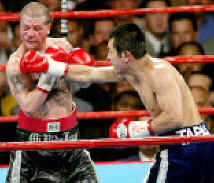 |
c. If both are lost. Referee according to God’s Law.
d. God sets the rules, our job as peacemaking mediator is to judge whether they are
being followed, regardless of who we are dealing with.
3. God to man.
What if we are to be a peacemaker between God and man.
a. Christians are to judge if the one being refereed is following the rules set by God
for mediation between themselves and him.
b. If they have not been saved God’s way (which is the only way) then we are
to let them know they need to be.
II Cor 5:20 “Now then we are ambassadors for Christ, as though
God did beseech [you] by us: we pray [you] in Christ's
stead, be ye reconciled to God.”
|
4. God to Christians.
What if we are called to be a peacemaking referee between God and Christians.
a. Not all Christians are following God’s
rules and if they are not, then they need
a referee to tell them that they are breaking God’s rules and to
instruct them
how to properly follow the rules set down in the rule book.
Ro 8:7 “Because the carnal mind [is] enmity against God:
for it is not subject to the law of God, neither
indeed can be.”
Jas 4:4 “Ye adulterers and adulteresses, know ye not that
the friendship of the world is enmity with God?
whosoever therefore will be a friend of the world
is the enemy of God.”
Eph 5:11 “And have no fellowship with the unfruitful works
of darkness, but rather reprove [them].”
|
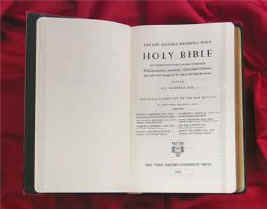
|
b. Reprove and rebuke are simply different forms of the same Greek word.
Rebuke is just a sharper reproof; and, many times, it is a public one.
Titus 1:13 “This witness is true. Wherefore rebuke them sharply,
that they may be sound in the faith;”
2:15 “These things speak, and exhort, and rebuke with all
authority. Let no man despise thee.”
I Tim 5:19 “Against an elder receive not an accusation, but before
two or three witnesses. Them that sin rebuke before
all, that others also may fear.”
c. We are to do so in love.
Eph 4:2 “With all lowliness and meekness, with longsuffering,
forbearing one another in love;”
Gal 6:1-2 “Brethren, if a man be overtaken in a fault, ye which are
spiritual,
restore such an one in the spirit of meekness;
considering thyself, lest
thou also be tempted. Bear ye one
another's burdens, and so fulfil the
law of Christ.”
d. It is obvious that a Christian sometimes needs a peacemaker that can referee
between themselves
and God to affect a reconciliation.
D.
The third thing involved in being a peacemaker is acting as a
Counselor.
|
As a peacemaker, we also have to be a counselor.
1. Proverbs has much to say about counsel and counselors.
Pr 11:14 “Where no counsel [is], the people fall: but
in the multitude of counsellors [there is] safety”
12:15 “The way of a fool [is] right in his own eyes:
but he
that hearkeneth unto counsel [is] wise.”
|
 |
12:20 “Deceit [is] in the heart of them that imagine
evil: but to the
counsellors of peace [is] joy.”
2. Paul knew what kind of counsel to give.
Acts 20:26-27 “Wherefore I take you to record this day, that I [am]
pure
from the blood of all [men]. For I have not shunned to
declare
unto you all the counsel of God.”
3. It is never to be council from our own wisdom, but from the wisdom of God.
I Cor 3:19 “For the wisdom of this world is foolishness with God.
For it is written, He taketh the wise in their own craftiness.”
|
Jas 3:14-18 “But if ye have bitter envying and strife in your hearts,
glory not, and lie not against the truth. This wisdom descendeth not
from above, but [is] earthly, sensual, devilish. For where envying
and strife [is], there [is] confusion and every evil work. But the
wisdom that is from above is first pure, then peaceable, gentle, [and]
easy to be intreated, full of mercy and good fruits, without partiality,
and without hypocrisy. And the fruit of righteousness is sown in
peace of them that make peace.” |
E.
Putting it into practice- acting as a
Peacemaker.
1. Sometimes we act as a mediator.
a. To the lost, we have to be a mediator, or to be more precise, we act as the
messenger that delivers the message of Christ, the true mediator.
Without Christ there is no hope of truly mediating between antagonists,
God and man, or man and man.
b. To the saved, we have to act as a mediator between them and God, when they are
disobedient to Him; and, we may also have to act as a mediator between two
Christians that are mad at each other.
c. In all of these: God to lost, God to saved, saved to saved, and saved to lost,
Christ and/or His Word, is the answer.
2. Sometimes we have to act as a referee.
a. As a referee we make sure that the rules
of Salvation set down by God are followed
by the lost to make peace between them and God.
b. And we also must make sure that the rules set down by God are followed by the
saved.
3. Sometimes we have to act as a counselor.
a. We make sure that we give only the counsel of God.
b. Help them to understand that they must follow God’s rules and help them to
develop the habit of doing so.
c. We must do all of this in love.
4. Peacemakers.
a. Christ: He was the greatest peacemaker of all time. Between God and man, and
between man and man.
1. He was our example, and He was called the,
Jn 3:16 “... only begotten Son...”
2. He was the first of many.
Ro 8:29 “For whom he did foreknow, he also did predestinate [to be]
conformed to the image of his Son, that he might be the
firstborn among many brethren.”
b. Us:
By following His example, we will be called the children of God.
Mt 5:9
“Blessed [are] the peacemakers: for they shall be called the children of God”
Make sure you have memorized Mt 5:9 with proper punctuation.
You will be
required to quote it from memory for the Scripture
Memorization practice Test and for the Lesson One Test.
You will not include the quotation marks nor the scripture
reference, Matthew 5:9, in your answer.
You will also be
asked if you
meditated on the precept taught in this Beatitude.
| 1. You are
required to click HERE
to go to the practice index page to practice your scripture memorization before proceeding to the Lesson test.
On the practice index page, scroll down to the practice test for this Lesson
and click on it. No practice test scores are added to your file. If you do not
pass the practice quiz, then to take it again just close the test and you will return to the practice index
page and you can choose the test to take it again. When you are finished with your practice, close the practice page to return to this page. |
| 2. You can
not proceed to the Lesson Test without first having a 100% score on the
Scripture Memorization test. Take it as many times for practice as is
necessary to achieve the required score of 100%. |
|
3. Did you
meditate on this beatitude as you were instructed to do?
(Click
one answer.) Yes No Was I supposed to
meditate on it? |
When
you click the TEST link it will download
to your computer. When download is completed, click
"Open" or "Open when done". A window may pop
up
stating that "Windows protected your PC". Click
"More info" and then click "Run anyway" in
the white rectangular box at the
bottom of that window.
-
RESULTS PAGE -
Be
sure to submit a copy of the Results page
in order to have your score registered
to your file.
LESSON SEVEN TEST
Lesson test is
"open book" except for the verse memorization question
which must be answered from memory alone as a closed book question.
You cannot proceed to the next Lesson until the day after you have
passed this Lesson Test and found all of the correct answers
in the textbook to all questions missed on this test
even though you received a passing score.
Two Interrelated Beatitudes
LESSON
EIGHT
The
persecuted for righteousness.
Memorize Mt
5:10 with proper punctuation.
You will need it for both the section test as well as for the Final Test.
Matthew 5:10
"Blessed are they
which are persecuted for righteousness'
sake: for theirs is the kingdom of heaven."
ATTENTION:
Note the apostrophe after the final s in the word
" righteousness' " because you will be required to include
it whenever writing this verse for tests. Without
it the verse will be marked "Incorrect."
LESSON
NINE
The
persecuted for Christ.
Memorize Mt
5:11 with proper punctuation.
You will need it for both the section test as well as for the Final Test.
Matthew 5:11
"Blessed are ye, when men shall
revile you, and
persecute you, and
shall say all manner of
evil against you falsely, for my sake."
These are two inextricably
interrelated Beatitudes.
You must read and include through verse
twelve for study purposes.
WARNING ABOUT TESTING!
Lesson eight and nine are
interconnected
and need to be studied together
as if they were one.
However, you cannot take both tests in one week.
You will need to take the Lesson Eight test at
the end of one week and the Lesson Nine
test at the end of the following week.
LESSON
EIGHT
The
persecuted for righteousness.
Memorize Mt
5:10 with proper punctuation.
You will need it for both the section test as well as for the Final Test.
Matthew 5:10
"Blessed are they
which are persecuted for righteousness'
sake: for theirs is the kingdom of heaven."
ATTENTION:
Note the apostrophe after the final s in the word
" righteousness' " because you will be required to include
it whenever writing this verse for tests. Without
it the verse will be marked "Incorrect."
Introduction:
We must study this verse from two viewpoints, heavenly and earthly.
A. Definitions:
1.
Gk dediwgmenoi,
(de-dee-owg-menoi), fr. diwkw diwkw (dee-o’-ko), to
persecute
a.
Secular definition of persecute.
1) To
pursue in a manner to injure or afflict, as on account of religious beliefs.
2) To harass. A synonym of
persecute. Defined as follows:
a) To trouble with importunities (constantly,
persistently troublesome)
cares,
or annoyances; vex, worry, perplex.
b) Military.
aa) To worry by
continual attacks without a general battle,
as by raids and dashes.
bb) To ravage;
raid.
b. Bible definitions: Gk
dediwgmenoi, (dee-di-owg-menoi),
fr. diwkw
(dee-o’-ko), to
rapidly pursue with malignity; to persecute.
2. Righteousness. Gk dikaiosunhV
(dik-ah-yos-oo-nay)
a. Secular definition: (F & W)
1) Conforming in disposition and conduct to
the divine standard of
right justice; upright; virtuous; blameless.
2) Morally right; equitable.
3)
Synopsis definition: right disposition and
conduct to God and to
man.
b.
Bible definition:
Righteousness:
Equity (in character or act.)
Spec.
(Christian) JUSTIFICATION.
Righteous:
equitable (in character or act); by impl. innocent, holy.
B. Two-fold study; earthly/heavenly.
1. Earthly viewpoint.
Since we are flesh and blood we will study from the earthly viewpoint
first.
a. Righteousness, equity (in... act)
b. When we try to live like God says that we must, then people
will persecute you; i.e.,
they will pursue us and harass us,
in short they will persecute us!
1) The
unsaved will persecute
us.
2) Sometimes the
saved will persecute
us.
3) Of course the
devil and his bunch will persecute us.
2. Heavenly viewpoint.
a. We may be considered rebels and troublemakers and be ostracized and
persecuted on earth;
but we will inherit the Kingdom from
God.
II Tim 2:12a "If we suffer, we shall also reign with [him]:"
II Tim 3:12 "Yea, and all that will live godly
in Christ Jesus shall suffer persecution."
Mt 5:10 "Blessed [are] they which are
persecuted for righteousness' sake:
for theirs is the
kingdom of heaven."
b. Remember our righteousness and our ability to
live righteous are inextricably bound up in Christ.
Therefore: our persecution is two-sided.
1) Persecution for
righteousness.
2) Persecution for
righteousness- in Christ.
Matthew 5:10
"Blessed are they
which are persecuted for righteousness'
sake:
for theirs is the kingdom of heaven."
Make sure you have memorized Mt 5:10 with proper punctuation;
including the apostrophe.
You will be
required to quote it
from memory for the Scripture Memorization practice
Test and for the Lesson One Test. You will not
include the quotation marks nor the scripture
reference, Matthew 5:10, in your answer.
You will also be
asked if you
meditated on the precept taught in this Beatitude.
| 1. You are
required to click HERE
to go to the practice index page to practice your scripture memorization before proceeding to the Lesson test.
On the practice index page, scroll down to the practice test for this Lesson
and click on it. No practice test scores are added to your file. If you do not
pass the practice quiz, then to take it again just close the test and you will return to the practice index
page and you can choose the test to take it again. When you are finished with your practice, close the practice page to return to this page. |
| 2. You can
not proceed to the Lesson Test without first having a 100% score on the
Scripture Memorization test. Take it as many times for practice as is
necessary to achieve the required score of 100%. |
|
3. Did you
meditate on this beatitude as you were instructed to do?
(Click
one answer.) Yes No Was I supposed to
meditate on it? |
When
you click the TEST link it will download
to your computer. When download is completed, click
"Open" or "Open when done". A window may pop
up
stating that "Windows protected your PC". Click
"More info" and then click "Run anyway" in
the white rectangular box at the
bottom of that window.
-
RESULTS PAGE -
Be
sure to submit a copy of the Results page
in order to have your score registered
to your file.
LESSON EIGHT TEST
Lesson test is
"open book" except for the verse memorization question
which must be answered from memory alone as a closed book question.
You cannot proceed to the next Lesson until the day after you have
passed this Lesson Test and found all of the correct answers
in the textbook to all questions missed on this test
even though you received a passing score.
LESSON
NINE
The
persecuted for Christ.
Memorize Mt
5:11 with proper punctuation.
You will need it for both the section test as well as for the Final Test.
Transition to Mt 5:11.
Remember that I said that verses 10 & 11 are actually two
inextricably interrelated beatitudes, with verse 11 zeroing in on one particular reason
for
the persecution mentioned in verse 10.
Verse 10 can be viewed as mostly (but not totally) persecution for how we
act.
Verse 11 can be viewed as mostly (but not totally) persecution for why we
act as we do.
|
Matthew 5:11
"Blessed are ye, when men shall
revile you, and
persecute you, and shall say all manner
of
evil against you falsely, for my sake."
|
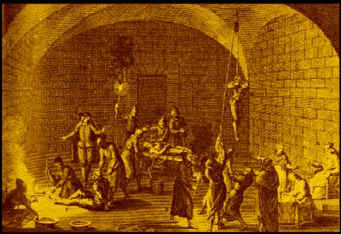 |
C.
Specific persecution for the sake of Christ.
1. persecution.
"Bad-mouthing" (speaking evil) to you, at you, and about you to others.
"Revile," Gk
oneidiswsin (on-i-didzo-sin),
to defame,
i.e., to rail at, chide, taunt.
Translated here as, "revile." Also translated as, "cast
in teeth, reproach, upbraid."
2. Physical persecution along with the verbal
persecution.
"... revile you, and persecute [you]..."
3. Portion that ties verses 10 & 11 together.
"... and shall say all manner of evil against you falsely, for my
sake."
4. Whether they persecute you for how
you act or why you act, the bottom line is
Christ and your
Christianity.
D. Rejoicing and Reward.
1.
Rejoicing.
a. I Pet 4:12-19
1) Verse :12 "Beloved, think it not strange concerning the
fiery
trial which
is to try you, as though some strange thing happened
unto you:
Don’t be befuddled- i.e., thinking "I don’t know what’s going
on!"
2) Verse :13 "But rejoice, inasmuch as ye are partakers of Christ's
sufferings; that, when his glory shall be revealed, ye may be
glad
also with exceeding joy."
|
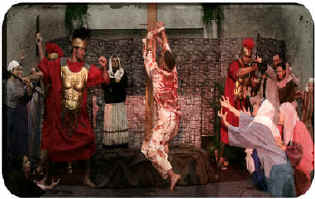
|
Rejoice now, looking forward to the "exceeding joy" you will
have later.
3) Verse :14-16
a) Verse :14 "If ye be reproached for the name of Christ, happy
[are ye];
for the spirit of glory and of God resteth upon you: on their part he
is evil spoken of, but on your part he is glorified."
Be happy reproaches.
b) Verse :15 "But let none of you suffer as a murderer, or [as] a
thief,
or [as] an evildoer, or as a busybody in other men's matters.
Not when you are bad and suffer for it- that’s nothing to be glad
about.
c) Verse :16 "Yet if [any man suffer] as a Christian, let him
not be
ashamed; but let him glorify God on this behalf.
But when you are a good Christian and suffer for it,
then glorify God and be
happy in your reproach.
4)
Verse :16-18
:16 "Yet if [any man suffer] as a Christian, let him not be
ashamed; but let him glorify God on this behalf."
:17 "For the time [is come] that judgment must begin at the
house
of God: and if [it] first [begin] at us, what shall the end
[be] of them that obey not the gospel of God?"
:18 "And if the righteous scarcely be saved, where
shall the ungodly and the sinner appear?
Glorify God that judgment HAS BEGUN!
5) Verse :19 "Wherefore let them that suffer according to the will
of God commit the keeping of their souls [to him]
in well doing, as unto a faithful Creator. "
God, He is faithful.
b. Mt 5:12 "Rejoice, and be
exceeding glad..."
That’s like saying, "JUMP UP AND DOWN FOR JOY!"
2.
Reward.
a.
Mt 5:12b " for [is] your reward in heaven:"
I Cor 2:9 "But as it is written, Eye hath not seen, nor ear heard,
neither have entered into the heart of man, the things which
God hath prepared for them that love him."
|
 |
b. God is keeping the records of our
deeds and the rewards for them.
Prov 15:3 "The eyes of the LORD [are] in every place,
beholding the evil and the good."
II Cor 5:10 "For we must all appear before the judgment seat
of Christ; that every one may receive the things [done]
in [his] body, according to that he hath done, whether
[it be] good or bad."
E. You’re in good company.
1.
Christ was persecuted and slain for righteousness sake.
2. The
Prophets were persecuted and slain for proclaiming righteousness.
Mt 5:12b "... for so persecuted they the prophets which were
before
you."
Neh 9:26 "Nevertheless they were disobedient, and rebelled
against
thee, and cast thy law behind their backs, and
slew thy prophets which testified
against them to turn
them to thee, and they wrought great
provocations."
3. The New Testament preachers were persecuted and killed.
a. John the Baptist in Mt
14:6-12.
b. Stephen in Acts 7:51-60. |
 |
c. Paul.
II Cor 11:25-27 "Thrice was I beaten with rods, once was I
stoned, thrice I
suffered shipwreck, a night and a day I have been in the deep;
[In]
journeyings often, [in] perils of waters, [in] perils of robbers, [in]
perils by [mine own] countrymen, [in] perils by the heathen, [in] perils
in the city, [in] perils in the wilderness, [in] perils in the sea, [in]
perils
among false brethren; In weariness and painfulness, in watchings
often, in hunger and thirst, in fastings often, in cold and
nakedness."
4. The reformers were persecuted and killed.
Some even had their bones dug up and burned years
after their deaths.
5.
Independent Christians have been killed by
the MILLIONS for their
beliefs over the centuries.
6.
But, in these last years,
we haven’t even BEGUN to suffer and die for
our
faith here in the United States as those in other countries are in
ever-growing numbers.
However, the persecution in the U.S. is growing
fast and even the laws of the land are changing toward us to
bring about
legal repercussions if we dare preach
righteousness.
When it finally comes we will be IN GOOD COMPANY!
That being: Christ,
and the
prophets, and the preachers, and the other Christians, who HAVE
died for their
faith- in the past by the millions and today by the thousands! |
 |
Mt 5:11
Blessed are ye, when
[men] shall revile you, and persecute [you],
and shall say all manner of evil
against you falsely, for my sake.
Make sure you have memorized Mt 5:11 with proper punctuation.
You will be
required to quote it from memory for the Scripture
Memorization practice Test and for the Lesson One Test.
You will not include the quotation marks nor the scripture
reference, Matthew 5:11, in your answer.
You will also be
asked if you
meditated on the precept taught in this Beatitude.
| 1. You are
required to click HERE
to go to the practice Quiz Bank to practice your scripture memorization before proceeding to the Lesson test.
On the quiz bank opening page, scroll down to the practice test for this Lesson
and click on it. Then click on "Ok" to open the practice
test. No practice test scores are added to your file. If you do not
pass the practice quiz, then to take it again just close the test and you will return to the Quiz Bank opening
page and you can choose this test to take it again. When you are finished with your practice, then close the practice page to return to this page. |
| 2. You can
not proceed to the Lesson Test without first having a 100% score on the
Scripture Memorization test. Take it as many times for practice as is
necessary to achieve the required score of 100%. |
|
3. Did you
meditate on this beatitude as you were instructed to do?
(Click
one answer.)
Yes
No Was I supposed to
meditate on it? |
When
you click the TEST link it will download
to your computer. When download is completed, click
"Open" or "Open when done". A window may pop
up
stating that "Windows protected your PC". Click
"More info" and then click "Run anyway" in
the white rectangular box at the
bottom of that window.
-
RESULTS PAGE -
Be
sure to submit a copy of the Results page
in order to have your score registered
to your file.
LESSON NINE TEST
Lesson test is
"open book" except for the verse memorization question
which must be answered from memory alone as a closed book question.
You cannot proceed to the Final Test until the day after you have
passed this Lesson Test and found all of the correct answers
in the textbook to all questions missed on this test
even though you received a passing score.
You can see how these two beatitudes,
Eight and Nine,
are so linked together that they needed to be studied together.
Mt 5:10-12
"Blessed [are] they which are persecuted for
righteousness' sake: for theirs is the kingdom of heaven. Blessed are ye, when
[men] shall revile you, and persecute [you], and shall say all manner of evil
against you falsely, for my sake. Rejoice, and be exceeding glad: for
great [is] your
reward in heaven: for so persecuted they the prophets which were before
you."
Make sure you have memorized Mt 5:11 with proper punctuation.
You will be
required to quote it from memory for the Scripture
Memorization practice Test and for the Lesson One Test.
You will not include the quotation marks nor the scripture
reference, Matthew 5:11, in your answer.
You will also be
asked if you
meditated on the precept taught in this Beatitude.
| 1. You are
required to click HERE
to go to the practice Quiz Bank to practice your scripture memorization before proceeding to the Final Test.
On the quiz bank opening page, scroll down to the practice test for each Lesson
and click on it. Then click on "Ok" to open the practice
test. No practice test scores are added to your file. If you do not
pass the practice quiz, then to take it again just close the test and you will return to the Quiz Bank opening
page and you can choose the same test to take it again. When you are finished with your practice, then close the practice page to return to this page. |
| 2. You can
not proceed to the Final Test without first having a 100% score on each Scripture Memorization test. Take them as many times for practice as is
necessary to achieve the required score of 100%. |
|
3. Did you
meditate on each beatitude as you were instructed to do?
(Click
one answer.)
Yes
No
Was I supposed to
meditate on them? |
When
you click the TEST link it will download
to your computer. When download is completed, click
"Open" or "Open when done". A window may pop
up
stating that "Windows protected your PC". Click
"More info" and then click "Run anyway" in
the white rectangular box at the
bottom of that window.
-
RESULTS PAGE -
Be
sure to submit a copy of the Results page
in order to have your score registered
to your file.
This Final Test is "closed book." Therefore, to receive the password
you must submit a "Closed
Book Test Contract" form.
FINAL TEST
Final Test is "closed
book."
It must be
done completely from memory with no help of any kind.
BIBLIOGRAPHY
1. The King James Version of the Bible.
2. Analytical Greek New Testament. Grand Rapids: Baker Book
House, 1981
3. Green, Jay P. Interlinear Greek-English New Testament.
Mac Dill AFB, Florida: Mac Donald Pub. Co., Fourth Edition, 1972
4. Metzger, Bruce M.; Coogan, Michael D., Editors. The Oxford
Companion to the Bible.
New York, Oxford: Oxford University Press, 1993
5. Davidson, Prof. F., and others. The New Bible Commentary.
Grand Rapids: Wm. B. Eerdmans Pub. Co. 2nd Edition, reprinted
1965
6. Funk & Wagnalls Practical Standard Dictionary
NY: Funk & Wagnalls Company, 1943
7. Strong, James. The Exhaustive Concordance of the Bible.
Nashville: Abingdon Press, 43rd Edition, 1984
8. Moulton, Harold K., Editor. Analytical Greek Lexicon Revised.
Grand Rapids: Zondervan, 1978
9. E-sword,
Bible program
King James Bible
Received Greek Text
Strong's Concordance
and Dictionary
Matthew
Henry's Commentary on the Whole Bible
Robertson's Word Pictures
10. World
Bank Poverty Net Data on Poverty
CD ROMs
The Holy Bible, A+. Third Edition, Advantage Plus
Dist. Inc.
10. The King James
Version of the Bible
11. The Greek Textus Receptus
12. Strong’s Numbers w/Lexicons
13. Bibles & Religion. Waltham, MA: CD Titles, 1996
14. Galaxy of Clipart. Deluxe Edition, San Luis Obispo, CA:
RomTech, Inc., 1997
15. The Deluxe Multimedia Bible. Rancho Dominguez, CA: Cosmi
Corp., 1996
ONLINE
16. http://www.4woman.gov/News/English/621267.htm
17. http://religions.pewforum.org/reports
18. http://jonathanignacio.wordpress.com/2009/03/09/barna-research-how-many-adults-have-a-biblical-worldview/
19. http://209.85.173.132/search?q=cache:g5GdaO8Dsf4J:www.psychiatryonline.com/DSMPDF/dsm-i.pdf+DSM-I&cd=1&hl=en&ct=clnk&gl=us#86
20. http://jonathanignacio.wordpress.com/2009/03/09/barna-research-how-many-adults-have-a-biblical-worldview/
21. http://www.barna.org/barna-update/article/12-faithspirituality/260-most-american-christians-do-not-believe-that-satan-or-the-holy-spirit-exis
22. http://commons.wikimedia.org/wiki/File:Irish_potato_famine_Bridget_O%27Donnel.jpg#file
23. http://www.historyplace.com/worldhistory/famine/hunger.htm
24. http://www.unep.org/OurPlanet/imgversn/154/lonergan.html
25. http://www.waterforpeople.org/site/PageServer
26. http://www.nytimes.com/2002/02/03/magazine/the-trouble-with-self-esteem.html?pagewanted=1
27. http://www.janegoodall.ca/project-blue/WaterintheDevelopingWorld.html














































